#the grim way he has portrayed actually dating women
Explore tagged Tumblr posts
Note
yeah i’ve actually seen quite a few people on twitter push the bi louis agenda! and most of those people think harry is gay like solely attracted to men. it’s kinda like the roles have been reversed and suddenly harry is “the gay one” which is quite interesting. but nah personally there’s nothing so far that would lead me to believe louis is actually attracted to women
anon 2: i don’t believe in larry so it’s a different perspective, but to me louis comes off as very much into women. i think a lot of the “louis is the obvious gay one” comes from decade long stereotypes that really don’t hold any bounds if you take a step back and look at it without larrie colored glasses, and i wouldn’t be surprised if it was also peddled more because of doubt that he actually isn’t— or is exactly who he presents himself to be to the public, i should say.
+++++
The way Louis's fandom is shifting and shaping before our eyes, I love to see it....anon 2 out there showing how his team is gettin' done what they want to get done!
#louis tomlinson#for anon 2 i wouldn't say that it's ALL 'stereotypes'#louis himself has played with a lot of things that say it loud and underline it#the 'flamboyant' descriptor#turning mr camp off and on#the g-a-y event and aftermath#the apple situation#the grim way he has portrayed actually dating women#i'm all for what he's doing now#but i think he's done a lot of things in the past that weren't just oh look at this kid in the braces
3 notes
·
View notes
Note
Send me a ☕️ and a topic and I’ll talk about how I feel about it lol: People hating Leon because he is a crusader. Or other reasons people hate Leon. (I had no idea people hated him. Also, can I be an emoji anon with a tag? I want to be 📈 anon.)
Send me a ☕️ and a topic and I’ll talk about how I feel about it lol

This is a multi-layered topic if there ever was one because I have observed so many hateful, vindictive and downright petty remarks about Leon as a character that consistently drain me of all will and life since most of which are not even deserved or educated for that matter. So let’s tackle with the complaint that you’ve actually emphasised and the one that holds some considerable water--the fact that Leon was supposed to be a part of the crusades.
This is was obviously a pretty profound historical event that should NOT be swept under the rug, ignored or excused by any means, and truly I do understand people’s discontent with this aspect of his character and the connotations of a person involved with these events being portrayed as a protagonist of all things. However, my usual rebuttal to this complaint when raised in context with Leon is threefold. Firstly, the game got its dates confused and actually placed the events of Lament of Innocence in the year 1094 whereas the crusades didn’t begin until a year later, at which point Leon had already abandoned the church and set down another path entirely.
While the game claimed it was taking place during the era of the crusades, their dates were a little out of whack (along with numerous other factual inconsistencies, though it’s not like I was expecting exact historical accuracy from my campy vampire fantasy games where women’s souls turn into whips and everyone is unbearably beautiful.) In my canon especially, I do not play Leon as ever having been part of the crusades when they were actually in full swing because of this fact, even if he has been an integral component to numerous wars in Europe and beyond.
And secondly, everyone seems to conveniently forget a large part of Leon’s character arc is abandoning the church and its self-serving behaviours in the game’s opening act, and with this Leon was stripped of his ancestral home, his title, his wealth, everything that he had accrued for himself in the course of his life and everything that has quite literally defined him since the day he was born. As soon as the church proved themselves to be more concerned with vapid, intangible ideas of moral purity instead of actually protecting the citizens from literal monsters, Leon abandoned their path to instead set out and accomplish what they were too cowardly and too selfish to; devoting his entire life--nay, his entire bloodline to that cause henceforth. Yes, Sara’s kidnapping was part of the driving force behind this conflict, so I don’t claim that his intentions were entirely philanthropic and unselfish, but I find it difficult to believe he would be this willing to openly disown the church and all the privileges he enjoyed as their most valued and decorated pawn if he did not also fundamentally disagree with the way they conducted themselves at this point. I also find the fact that he took on this massive burden of protecting humanity instead of being a part of its ugliest problems to suggest an act of penance for the lives he has taken as much as it is to honour Sara’s wish.
Leon wants to protect people. He was raised to believe that what he was doing was good and just and for the protection of his people, indoctrinated with the beliefs of the greater systems of power of the time and was reared to serve the needs of which at threat of punishment and consequences for failure to comply. He is not a vindictive, cruel or bloodthirsty murderer contrary to what some people like to believe. He did not kill people for honest-to-God hatred and malice. He does not enjoy killing, nor celebrate it, and speaking from my interpretation, he never enjoyed it even when he was a soldier--it was just a grim and necessary evil he was expected and conditioned to carry out (I have many headcanons about how he would pray even for his enemies and had engravings on his sword related to this.)
And lastly, do you ever notice how people love to complain about Leon being a crusader, but not a word of that same criticism is launched against Mathias/Dracula even though he too would have been a crusader by that logic? I don’t see a word raised about a literal genocidal monster being “problematic” to the degree that Leon is positively crucified for this online, even as a very vocally repentant man whereas Mathias becomes wholly unrepentant and kills even more people than he would have as a crusader after the fact; this telegraphs to me at least that people just don’t have the faintest idea what they’re talking about or otherwise are singling Leon out for clout to join in with the constant shitting on his character people love to do.
This though leads me into another point of contention in that I always see people on twitter and tumblr making their snarky comments about the fact Leon must be a horrible person because he was a church-serving knight and must be the kind of hateful individual that would use derogatory slurs, despise other races and likewise bear an inherent disgust for LGBT+ people. This in particular grates deeply on my nerves for the simple fact that it’s beyond me how people can look at Leon, his speech, his behaviour and his actions in the course of the game and assume he would be a man of so much pure vitriol and intolerance for other people, especially when he literally abandoned the church and their extreme beliefs guys would you just fucking FOCUS YOU ABSOLUTE DUNCES. I do strongly believe the people spitting this kind of rhetoric are just ignorant sheeple following the trend of whatever’s popular to clown on for clout, because even with his christian roots, people conveniently always forget that Leon takes his life into his own hands and rebels against the primary oppressors involved in which that would have enforced those beliefs and behaviours. Needless to say, I wouldn’t be surprised if these people didn’t even read the wiki or play the game and are getting their information from other people with their heads stuck up their ass putting this false information into circulation. Leon is so sorely, wrongly characterised by the fandom at times it physically pains me.
Speaking of, can we talk about the people who love to headcanon Leon as being stupid and illiterate? I cannot stand these ignorant, unfunny, uneducated fucks who constantly bark about this opinion unironically, because as a knight of all things, Leon would have been subjected to a very rigorous system of education, including writing and reading (among many other miscellaneous and desired abilities) as well as performing academic studies beneath chaplains and priests--for the standards of the time, knights were very well educated, and Leon is no exception. The game is perhaps to blame in part for this for scripting Leon to sound very naive and bumbling to a degree, which I believe was an attempt at imparting the quality of purity and innocence that was intended for his character (which also lmao is at odds with people’s desire to shit on him for being a bad person.) But people just take that at face value and assume Leon is a complete idiot when he is quite the opposite and would have to be to even ascend to his position of knighthood as it is. Let’s not forget he would have to be incredibly exceptional too to have ascended to knighthood five years too early! Leon is not stupid, and I will fight anyone in the pit who tries to tell me that he is, you absolute imbeciles.
#{tldr raise a bad word about leon in front of me and prepare to be smote}#{also i can almost guarantee these kinds of people dont say a single word against the shitshow of netflixvania which is LOLLLLL}#{yall need to pick your battles sis}#{HELLO ANON THANK U FOR UR INTEREST LOL u are hereby christened the stonks anon}#📈 Anon#Anonymous
5 notes
·
View notes
Text
Winter 2019 Anime Overview
I enjoyed every single one of the five anime I watched this season: Dororo, My Roommate is a Cat, Mob Psycho 100 II, The Promised Neverland and Kaguya-sama: Love is War.
So here are my reviews! I’ve cut back on the anime overview a lot, so these are shorter reviews than usual (though not quite as short at I’d like. someday I’ll be able to restrain myself)
Since I liked all of the shows, these aren’t in a strict worst-to-best order or anything, but the ones I found most impressive ARE nearer to the bottom. So let’s dig into last season’s anime.
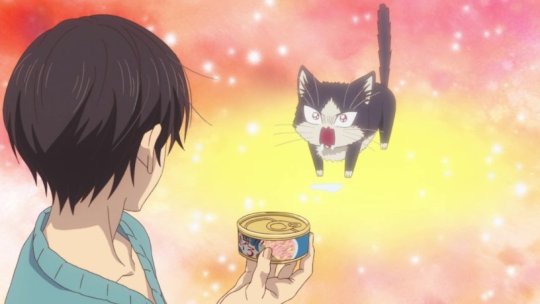
My Roommate is a Cat
Premise: An antisocial writer in his early 20s adopts a cat and they both get their worlds expanded as they bond.
My take: Much like the kitty it centers on, this show is super cute, sweet and fluffy. If you’re a cat-lover and want to bask in some kitty adorableness, I encourage you to check it out. At first, I was afraid the main character Subaru’s grumpy misanthropy might be too much- I could certainly empathize with being socially isolated and avoiding people, but the way he was just rude toward others was grating. Fortunately, his character development is swift, so he quickly went from misanthrope to anxious-introverted-mess-who-awkwardly-muddles-through-social-interaction-for-the-sake-of-his-kitty, which I found EXTREMELY relatable. Subaru is coping with the loss of his parents and the fact he took them for granted while they were alive as well, so there are quite a few heart-string tugging moments.
The show’s central gimmick is that events will be told from Subaru’s point of view and then we’ll get his kitty Haru’s side of things. Yep, the cat narrates part of the show, which is how I knew I was in it for good. And Haru’s a very good cat! She’s adorable without being cloying, and at least realistic in how most of her thoughts revolve around food. Seeing her warm up to her hopeless human is just as sweet as seeing Subaru warm up to her. As a former stray cat, she has a rough backstory, so if even a restrained depiction of kitty death is too much for you, look out for that part. This show isn’t afraid to bring the feels, but it keeps things positive overall. Subaru’s friends are supportive and help a new pet owner out, and we even get a cute doggie in the mix. Overall, if you want a relaxing, nice watch with a simple, sweet story, you could do a lot worse than My Roommate is a Cat.

Dororo (Episodes 1-12)
Premise: Thanks to his father making a deal with demons, Hyakkimaru has to wander Japan and fight monsters to get his body parts back. He meets up with a young thief named Dororo.
My take: Dororo is a very loose adaptation of the 1960′s manga by Osamu Tezuka, who’s known as the godfather of manga. I was familiar with Dororo thanks to watching the live action movie for an article when I worked at epicstream (it must not have left an impression bc I remember very little) so I was curious to check this out. I ended up reading the manga too, and overall, I find it pretty impressive as an adaptation. It does a lot to make a really dated and incomplete-feeling manga more palatable and cohesive for a modern audience. Maybe I’ll do a full post expanding on those thoughts sometime, because the changes really are worth examining.
Dororo is definitely not for everyone- it’s a grim, dark show with lots of death and destruction.The story is especially not kind to women, who tend to die or be demons. The exceptions to this (such as a lady demon actually being presented as sympathetic) are mainly anime-original. Actually, while the anime eschews the original manga’s cartoon-y, jokey tone to be more serious, it actually has a much lower body count and more hopeful tone than the original, a contrast I find pretty interesting. But “more hopeful” is still not very hopeful. The story has pretty strong anti-war undertones and criticism of how authority exploits people, and there’s a lot of “these are the horrors of war” scenes and even a scene where Dororo witnesses a woman engaging in unhappy, reluctant sex work.
The premise of the story, a guy made up of mostly prosthetics on a quest to get his body parts and senses back, is also a dicey one in how it treats disability. The anime does at least make updates to the manga that lend the story a little more complexity on that front. In the manga Hyakkimaru can basically hear and speak through telepathy already and he’s portrayed as simply joyous whenever he gets a body part or sense back, despite not having a practical need for them.
The anime wisely jettisons the telepathy thing, meaning that Dororo and Hyakkimaru have some difficulty communicating, something that adds an interesting layer to the story. It means we find out about Hyakkimaru’s personality in bits and pieces alongside Dororo, going on a journey of discovery with him. And Hyakkimaru getting senses back is treated in a more realistic mixed-bag way- when he gets his hearing back, for instance, he has difficulty adjusting to it and experience serious sensory overload. It’s not really clear how he feels about a lot of things, much less the changes he’s going through.
Dororo himself is the heart of the show, really, and I find him to be really endearing and engaging as a character. His boundless energy and chattiness balance out the aloof Hyakkimaru, but he never gets overbearing or obnoxious. He’s been through a lot himself, and has a good heart. One thing worth keeping an eye out going forward is how Dororo’s gender will be handled. Dororo is afab, but in the original manga very vehemently lets everyone know he’s a boy. The anime also lets you know Dororo’s afab halfway through, but hasn’t really done much otherwise in exploring Dororo’s gender identity. I do think it’s unlikely we’ll get a handling of it as bad as the manga’s final chapters (Manga Hyakkimaru had a lot of strong, intrusive opinions about what Dororo “really” is that I think his anime version is unlikely to have based on his restrained characterization so far), but who knows.
Overall, Dororo is a nicely animated and well put-together dark action series so far. I’m not sure I would have ended up watching it if I wasn’t so interested in examining it as an adaptation, but the ride’s been pretty okay and worthwhile.
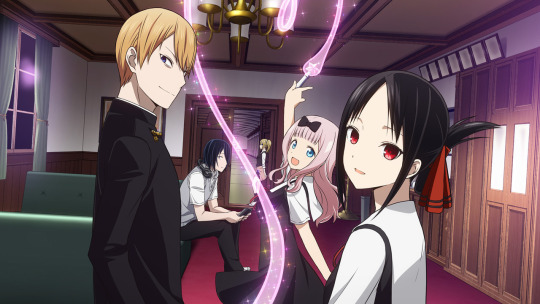
Kaguya-sama: Love is War
Premise: Miyuki Shirogane and Kaguya Shinomiya are the top students at their prestigious school, and heads of the student council. They also have a crush on each other, but both are too full of pride (and nerves) to make the first move, so they come up with schemes to trick the other into confessing. Hijinks ensue.
My take: Kaguya-sama is a wildly funny rom-com about two idiot smart kids who don’t know how to say how they feel. It’s mostly a really good time. There’s a lot of laugh-out-loud moments. The characters are a lot of fun, especially Kaguya’s friend Chica, who is pure chaos in human form and has some of the best lines in the show. The animation and direction of the show are also impressive and lavish, elevating already good gags into greatness. The finale also does that thing where it’s all suddenly surprisingly emotional and hits you really hard with all the feels, showing a little depth and true friendship among all the characters involved.
However,there are a few “yikes” moments, and the most uncomfortable one and likely the biggest deal breaker was the “Kaguya gets sick” arc, which happens roughly the last half of episode 9 and the start of 10. In it, we’re treated to tropes that are both really tired and really uncomfortable, like Kaguya being sick and her friend, for some reason???, tacitly encouraging Miyuki to take advantage of her in her weakened state. Miyuki does not, but Kaguya pulls him into bed and he falls asleep due to sleep deprivation (which is admittedly relatable) and when they wake up she believes for a time he did assault her and throws shit at him, at which point he whines about being villainized even though he “held back”.
During the next episode, Kaguya is ~secretly kind of upset he didn’t assault her because doesn’t he find her appealing~, a trope that really needs to die bc the myth girls “really want to be assaulted” is dangerous. There were a couple okay moments in the whole thing, like Miyuki deciding he should have shut the whole thing down more firmly and apologizing for an infraction, and since Miyuki didn’t cross a significant line it doesn’t ruin their relationship or make them impossible to root for or anything, but the whole thing is tired and gross and unnecessary and not all that funny. I was able to handle it because I got warned ahead of time, but it was a chore of an arc, so here’s my warning.

The Promised Neverland
Premise: Emma and her friends Ray and Norman are orphans being raised in the happy, idyllic Grace Field House. They’re never been outside it though, and there’s a wall they’re never supposed to approach. When Emma discovers the truth behind the orphanage, a tense thriller begins.
My take: I was looking forward to this one based on word of mouth, and mostly it doesn’t disappoint! The writing hooked me enough that I’ve picked up the manga to continue the story. This a rich story. It’s an intense game of cat and mouse between genius kids and unscrupulous adults where the stakes are super high. Emma and her friends pull out all the stops to outwit and escape the ones holding them captive, and the twists and turns of the narrative are delivered well. There’s also some social commentary buried under its horror to add some bite. This essay goes into how it comments on forced societal gender roles, for instance.
A thrilling plot can only shine thanks to its characters, and Emma is great protagonist. Her determination to save her family and unpredictable nature make her fun to follow. She’s a rare and refreshing example of a female shonen protag, and she sells that power of friendship stuff pretty well when she has the brains and skills to back it up. The three main kids balance each other well, with Ray’s cynicism and pragmatism contrasting Emma’s stubborn idealism, and Norman stands in the middle as someone who’s inclined to think like Ray but WANTS to be more like Emma. Despite the many conflicts and differences between them, these kids are ride and die, and the show does a good job selling their familial-friendship. A lot of the moments between them are truly heartwrenching.
The story has a big glaring flaw, though, and that’s Sister Krone and the racism regarding her. It’s not my lane, so please read Jackson P. Brown’s essay here for more info. The anime not only replicates the problem with her design but makes things arguably worse than the manga by making her personality a caricature as well. The anime portrays Krone as far more unhinged and exaggerated than her vindictive but more controlled and canny manga counterpart, even adding this weird thing where she rants at and beats up a doll. This review on episode 8 talks about the author feels the anime failed with sister Krone and his feelings on Krone as a black character well, it’s definitely worth a read.
While I have those issues with the anime’s choices, I was impressed with how the last few episodes were directed. They hit it out of the park, leaving me breathless, emotional and wanting more. Thanks to that, I’m now reading an enthralling adventure manga! This anime was definitely flawed but I can’t deny I’m interested in seeing how the second season will shake out.
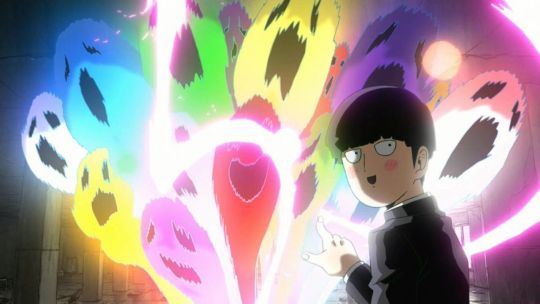
Mob Psycho 100 II
Premise: Season 2 continues to tale of Mob, a ridiculously powerful psychic middle schooler. He’s in the employ of Reigen, a con-artist who has fooled many (Mob included) into thinking he has legitimate psychic abilities.
My take: Holy wow. Mob Psycho’s first season had some incredible animation, atmosphere and direction, but season two fires on all cylinders. I’m glad I caught up in time to experience the show with everyone else these last few weeks, because it was always a treat- a visual feast full of heartpumping action and lots of sincere emotion.
Mob Psycho is an animation extravaganza, with some sequences that wouldn’t feel out of place in a high budget movie, dripping with atmosphere, artistry and aplomb. But the story and characters are really solid too and it has some nice themes and messages at its core. Mob is one of the goodest good boys in all of anime and he grows a lot throughout this season. At the core of the show is the idea that no one is worthless and also no one is more “special” than anyone else, that having power doesn’t give you the right to put yourself above others, that no person is inherently superior or inferior to any other, that even if you’re born with some super talent, you still need to try to improve yourself, value other people and the things they can do that you can’t and work hard to live a balanced life. Being powerful or born with a talent doesn’t mean you have the answers or know better-so it’s all about striving to make good, compassionate choices and taking control of your own life.
There’s a lot of stories that pay lip service to themes like these without really doing much to back it up, but this show sells it with an earnestness that few manage. Mob is a quiet and gentle boy, and you genuinely believe it when he says he doesn’t like fighting or using his powers on other people, and when he breaks down in tears because for all his power he can’t figure out how to set someone on the right path this time, your heart aches. The fact that Mob actually has difficulty coming up with the right answers and will sometimes gets overwhelmed by emotion and loses control, but keeps striving for honest communication, makes his approach come off as a lot more believable than the typical shonen-hero-converting-bad-guys-with-a-confident-friendship-speech bit.
The character relationships in the show are also good stuff, particularly the relationship between Mob and Reigen, which develops a lot this season with Reigen having to grapple with how yeah, he’s been kinda terrible and dishonest, especially with this kid he cares about and there’s a point where people have enough of it. There’s a lot of nice growth there.
All together, Mob Psycho is just Good with capital G. I do wish there were more girls in it, and there is a dark skinned character who’s caricature-ish in his design (he barely shows up in this season iirc), but otherwise it’s a quality rec and breathtaking example of the truly transcendent heights anime can reach.
#winter 2019 anime#anime overview#Mob Psycho 100#my roommate is a cat#the promised neverland#dororo#kaguya sama love is war#kaguya sama: love is war#kaguya sama wa kokurasetai#my reviews
63 notes
·
View notes
Photo

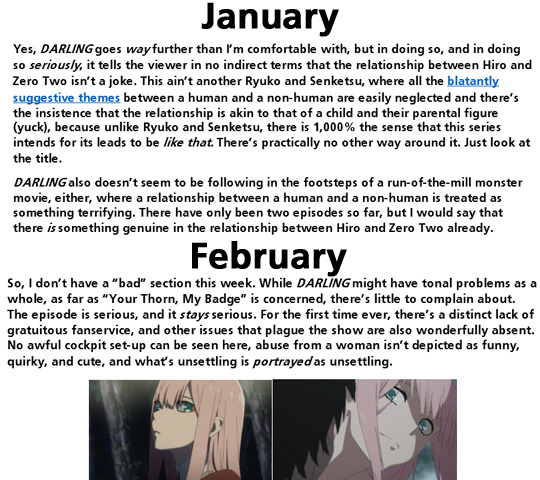
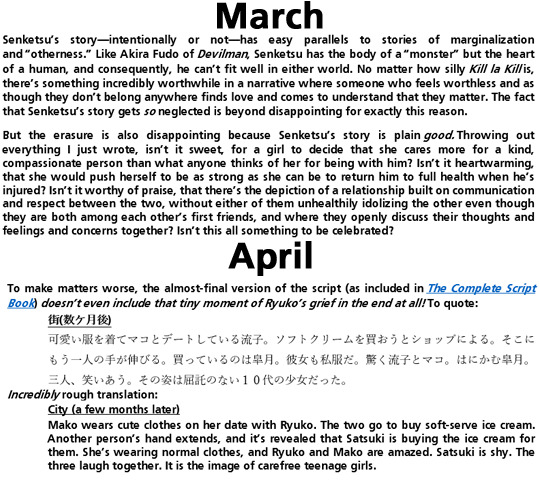
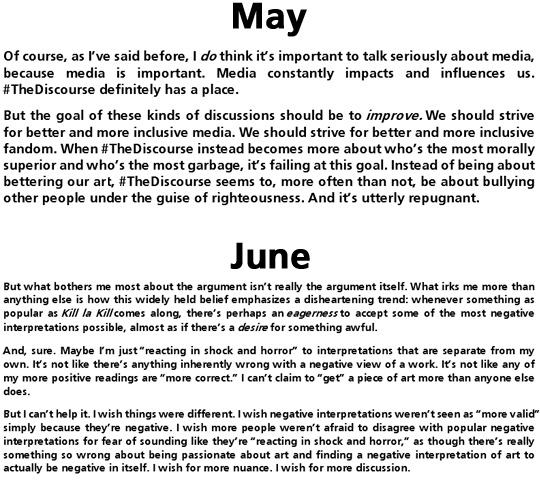

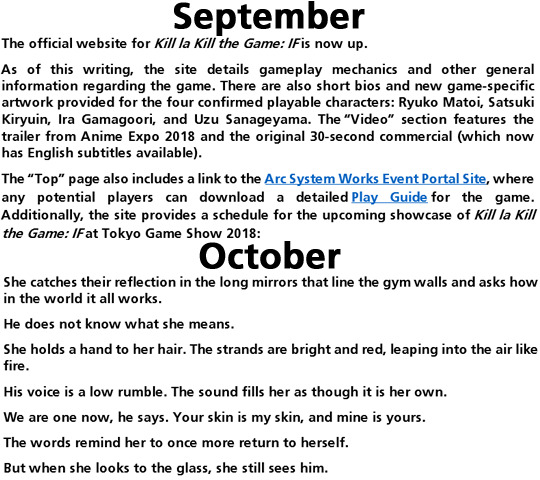
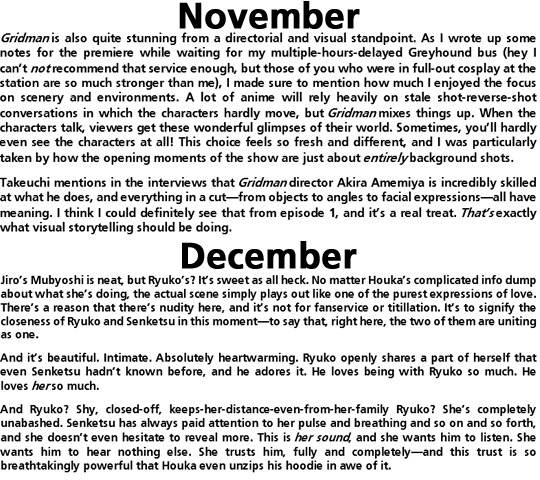
I can’t think of anyone else who does this kind of year-in-review compilation for writing, but I put one together for 2017 and would like to continue to do so. It’s just nice to get a sense of what I’ve accomplished in 12 months, especially when I feel that I haven’t accomplished much of anything.
Unlike last year, though, I’m including all kinds of writing I’ve done this time around. My non-fiction work is important to me, too.
Mental health talk and text versions of these snippets under the cut.
To cut right to the chase, 2018 was rough. No matter all my flowery pep talks trying to be positive and uplifting, my feelings of inadequacy skyrocketed. I drenched myself in my own self-depreciating “humor,” and I ridiculed my hopes and dreams. Every time I felt my work was poorly received, I’d tell myself, “Well, what did you think would happen? That people would actually like what you do?”
But I never wanted to stop “keeping on.” I wanted to continue what I loved no matter what, and I threw myself into my writing. There would be days where I wouldn’t eat or do anything else until I’d finished an essay. I spent practically the entire month of November sleeping on my couch because I never wanted to “go to bed” until I had written more, posted more, done more. My head became filled with a constant mantra of, “You’ll never be enough.”
And I wanted to prove myself wrong. I wanted to be something—even if that something was just being happy with myself. But all the proclamations that I’m “getting better!” and “improving so much!” never did much for my confidence. What good is progress, after all, if I still feel like I’m nowhere?
Still, I tried to be productive about my failure. So I wasn’t satisfied with what I was doing. What could I do to be satisfied? I took different approaches to my content. I asked for advice, opinions. But that feeling of being nothing remained.
And yet, I’d always say things like, “I’m okay. I’m just frustrated.” Or, “I felt better after I binged some Netflix, haha.” I wanted to be helpful, inspiring. I wanted to tell people that it’s hard, but it gets better. I wanted to come off as the happy person I so wish to be, and I felt guilty every time I revealed any of my insecurities. Nobody wants to hear that stuff. Everyone suffers. I’m not special.
So maybe that’s why I feel it’s important to say now that I’m not okay. I’m hurting. I’m in pain. There are times I hate myself so much that I can think of nothing but how I’m ugly both inside and out, that I’m selfish, ungrateful, a total bitch.
And I want to be better! Of course I do. And I want to continue to work to be better.
But right now? I’m not okay. And running away from that fact and trying to hide it won’t help me or anyone else.
It was a rough year. I feel I made a total fool of myself more times than I would care to admit. But I also created a lot of art. I shared a lot of art with the world.
And you know what? I am proud of myself. I did impact people with what I did. I answered over 100 asks! I added more than 17 pages to my “replies” tag! I’m not nothing, and I need to stop treating myself like I am!
On to a better, healthier 2019!
Texts
January
Yes, DARLING goes way further than I’m comfortable with, but in doing so, and in doing so seriously, it tells the viewer in no indirect terms that the relationship between Hiro and Zero Two isn’t a joke. This ain’t another Ryuko and Senketsu, where all the blatantly suggestive themes between a human and a non-human are easily neglected and there’s the insistence that the relationship is akin to that of a child and their parental figure (yuck), because unlike Ryuko and Senketsu, there is 1,000% the sense that this series intends for its leads to be like that. There’s practically no other way around it. Just look at the title.
DARLING also doesn’t seem to be following in the footsteps of a run-of-the-mill monster movie, either, where a relationship between a human and a non-human is treated as something terrifying. There have only been two episodes so far, but I would say that there is something genuine in the relationship between Hiro and Zero Two already.
February
So, I don’t have a “bad” section this week. While DARLING might have tonal problems as a whole, as far as “Your Thorn, My Badge” is concerned, there’s little to complain about. The episode is serious, and it stays serious. For the first time ever, there’s a distinct lack of gratuitous fanservice, and other issues that plague the show are also wonderfully absent. No awful cockpit set-up can be seen here, abuse from a woman isn’t depicted as funny, quirky, and cute, and what’s unsettling is portrayed as unsettling.
March
Senketsu’s story—intentionally or not—has easy parallels to stories of marginalization and “otherness.” Like Akira Fudo of Devilman, Senketsu has the body of a “monster” but the heart of a human, and consequently, he can’t fit well in either world. No matter how silly Kill la Kill is, there’s something incredibly worthwhile in a narrative where someone who feels worthless and as though they don’t belong anywhere finds love and comes to understand that they matter. The fact that Senketsu’s story gets so neglected is beyond disappointing for exactly this reason.
But the erasure is also disappointing because Senketsu’s story is plain good. Throwing out everything I just wrote, isn’t it sweet, for a girl to decide that she cares more for a kind, compassionate person than what anyone thinks of her for being with him? Isn’t it heartwarming, that she would push herself to be as strong as she can be to return him to full health when he’s injured? Isn’t it worthy of praise, that there’s the depiction of a relationship built on communication and respect between the two, without either of them unhealthily idolizing the other even though they are both among each other’s first friends, and where they openly discuss their thoughts and feelings and concerns together? Isn’t this all something to be celebrated?
April
To make matters worse, the almost-final version of the script (as included in The Complete Script Book) doesn’t even include that tiny moment of Ryuko’s grief in the end at all! To quote:
街(数ケ月後)
可愛い服を着てマコとデートしている流子。ソフトクリームを買おうとショップによる。そこにもう一人の手が伸びる。買っているのは皐月。彼女も私服だ。驚く流子とマコ。はにかむ皐月。三人、笑いあう。その姿は屈託のない10代の少女だった。
Incredibly rough translation:
City (a few months later)
Mako wears cute clothes on her date with Ryuko. The two go to buy soft-serve ice cream. Another person’s hand extends, and it’s revealed that Satsuki is buying the ice cream for them. She’s wearing normal clothes, and Ryuko and Mako are amazed. Satsuki is shy. The three laugh together. It is the image of carefree teenage girls.
May
Of course, as I’ve said before, I do think it’s important to talk seriously about media, because media is important. Media constantly impacts and influences us. #TheDiscourse definitely has a place.
But the goal of these kinds of discussions should be to improve. We should strive for better and more inclusive media. We should strive for better and more inclusive fandom. When #TheDiscourse instead becomes more about who’s the most morally superior and who’s the most garbage, it’s failing at this goal. Instead of being about bettering our art, #TheDiscourse seems to, more often than not, be about bullying other people under the guise of righteousness. And it’s utterly repugnant.
June
But what bothers me most about the argument isn’t really the argument itself. What irks me more than anything else is how this widely held belief emphasizes a disheartening trend: whenever something as popular as Kill la Kill comes along, there’s perhaps an eagerness to accept some of the most negative interpretations possible, almost as if there’s a desire for something awful.
And, sure. Maybe I’m just “reacting in shock and horror” to interpretations that are separate from my own. It’s not like there’s anything inherently wrong with a negative view of a work. It’s not like any of my more positive readings are “more correct.” I can’t claim to “get” a piece of art more than anyone else does.
But I can’t help it. I wish things were different. I wish negative interpretations weren’t seen as “more valid” simply because they’re negative. I wish more people weren’t afraid to disagree with popular negative interpretations for fear of sounding like they’re “reacting in shock and horror,” as though there’s really something so wrong about being passionate about art and finding a negative interpretation of art to actually be negative in itself. I wish for more nuance. I wish for more discussion.
July
I mean, just imagine this. You’re fighting a battle whose outcome will literally decide whether or not your entire planet explodes into a billion pieces in like two hours. It’s not only your life on the line. Everyone you care about have their lives on the line, too.
To make matters worse, it ain’t going well for your side. You’ve been rendered basically immobile by a cheap attack from these world-destroying baddies… and so have all your allies. Things are looking pretty grim, to say the least.
And then one of your big-name enemies goes and does it. She laughs at your efforts and taunts you and—get this—she says something that totally insults your OTP.
Now, a normal person would probably not be thinking about OTPs during a fight to save the Earth from turning into confetti.
A normal person is not Mako Mankanshoku.
August
But I find Grosz’s thesis compelling in regards to Kill la Kill because, in a lot of ways, Ryuko and Senketsu do rather embody typical positions of men and women in fictional stories both East and West… except, the roles are reversed. Ryuko is the unruly, aggressive, and hot-blooded protagonist just as a man often is, and Senketsu exhibits many traits that are traditionally associated with women; he’s sensitive, emotional, and a considerable worrywart. Further, while I find the term “love interest” both degrading and unfitting for Senketsu in a series that Word of God denies any romantic intention for, I have to admit that he fits many of the conventions. In an anime with a cast primarily composed of women, the fact that Senketsu is arguably coded as male makes him, just as the standard heteronormative “love interest,” the most narratively significant character of another gender in the show (for just a few other examples, see Ran from Detective Conan, Sam from Danny Phantom, Katara from Avatar: The Last Airbender, and Tuxedo Mask from Sailor Moon). Whether I’m watching an anime or an American cartoon, I don’t think I’d be too surprised to see a scenario like the one from the end of Kill la Kill’s thirteenth episode, where a man tells a woman that he’s afraid of losing control and needs her to be there for him so that he doesn’t.
September
The official website for Kill la Kill the Game: IF is now up.
As of this writing, the site details gameplay mechanics and other general information regarding the game. There are also short bios and new game-specific artwork provided for the four confirmed playable characters: Ryuko Matoi, Satsuki Kiryuin, Ira Gamagoori, and Uzu Sanageyama. The “Video” section features the trailer from Anime Expo 2018 and the original 30-second commercial (which now has English subtitles available).
The “Top” page also includes a link to the Arc System Works Event Portal Site, where any potential players can download a detailed Play Guide for the game. Additionally, the site provides a schedule for the upcoming showcase of Kill la Kill the Game: IF at Tokyo Game Show 2018:
October
She catches their reflection in the long mirrors that line the gym walls and asks how in the world it all works.
He does not know what she means.
She holds a hand to her hair. The strands are bright and red, leaping into the air like fire.
His voice is a low rumble. The sound fills her as though it is her own.
We are one now, he says. Your skin is my skin, and mine is yours.
The words remind her to once more return to herself.
But when she looks to the glass, she still sees him.
November
Gridman is also quite stunning from a directorial and visual standpoint. As I wrote up some notes for the premiere while waiting for my multiple-hours-delayed Greyhound bus (hey I can’t not recommend that service enough, but those of you who were in full-out cosplay at the station are so much stronger than me), I made sure to mention how much I enjoyed the focus on scenery and environments. A lot of anime will rely heavily on stale shot-reverse-shot conversations in which the characters hardly move, but Gridman mixes things up. When the characters talk, viewers get these wonderful glimpses of their world. Sometimes, you’ll hardly even see the characters at all! This choice feels so fresh and different, and I was particularly taken by how the opening moments of the show are just about entirely background shots.
Takeuchi mentions in the interviews that Gridman director Akira Amemiya is incredibly skilled at what he does, and everything in a cut—from objects to angles to facial expressions—all have meaning. I think I could definitely see that from episode 1, and it’s a real treat. That’s exactly what visual storytelling should be doing.
December
Jiro’s Mubyoshi is neat, but Ryuko’s? It’s sweet as all heck. No matter Houka’s complicated info dump about what she’s doing, the actual scene simply plays out like one of the purest expressions of love. There’s a reason that there’s nudity here, and it’s not for fanservice or titillation. It’s to signify the closeness of Ryuko and Senketsu in this moment—to say that, right here, the two of them are uniting as one.
And it’s beautiful. Intimate. Absolutely heartwarming. Ryuko openly shares a part of herself that even Senketsu hadn’t known before, and he adores it. He loves being with Ryuko so much. He loves her so much.
And Ryuko? Shy, closed-off, keeps-her-distance-even-from-her-family Ryuko? She’s completely unabashed. Senketsu has always paid attention to her pulse and breathing and so on and so forth, and she doesn’t even hesitate to reveal more. This is her sound, and she wants him to listen. She wants him to hear nothing else. She trusts him, fully and completely—and this trust is so breathtakingly powerful that Houka even unzips his hoodie in awe of it.
#just before 2018 ends over here!#goop makes a personal post#long post#ramblings#happy new year y'all!
19 notes
·
View notes
Text
Monthly Wrap Up: January

Wow, for starting a new reading year, things are going really well for me. First I read 13 books this month, which I am so surprised by, especially since 6 of this books were 500 pages or over. I attribute that to not tagging as many books, in fact I only did that for 7 of them. Aside from my high book count, I'm also on my way to achieving some personal reading goal's of mine. One is to complete 5 series, and I completed 3 this month. I also want to read more diverse books, and while I didn't read any authors of color, 3 of the books that I read featured diverse protagonists. Of the total books that I read 5 were new (one was a non fiction book, What Color Is Your Parachute, which is a great book for job hunting), and 7 were rereads. I also participated in 2 reading challenge's this month, one is the year long PopSugar 2019 Reading Challenge, which I did last year, and the other was a Pick My TBR challenge from the Reading Frenzy group on Goodreads, which will also be a year long challenge. I was able to read the book that was selected for the Pick My TBR challenge and I completed 8 of the prompts for the PopSugar challenge, which is a strong start. Something I also accomplished this month was reading books from several different genres, which is a long term reading goal of mine. There was paranormal romance, climate fiction, classics, contemporary, and even a few fantasies. In terms of my opinion of the books I read, I was all over the board. Now 5 star books, but there was everything from a 4 star to a 1 star. Still I would say January was a good reading month and hopefully the rest of the year continues on a similar note.
Abhorsen by Garth Nix: I really disliked Lirael but I knew I was going to read this one since I just had one more book and I already had the entire trilogy. I didn't bother tabbing the book because I gave up on that during Lirael and I didn't expect this book to get much better, so this review is going to contain all my spoilery thoughts on this book. First the things I liked about this book. I liked the animal companions. I liked Mogget in the first book but his appearance in the second book felt a bit awkward because of events at the end of Sabriel. I didn't like the Disreputable Dog at first because she just felt like a bit of a replacement for Mogget. In this book I really enjoyed both of them because I felt like they had distinct but likable personalities, while being these grounded companions but also ancient cosmic creatures. I also liked the magic system. The Charter magic/ Free magic and the Clayer library were the best aspects of the previous books. I think the Abhorsen bells are really cool, how each one has a different role, and all the history behind them that gets revealed. I also think Lirael improved in this one. She was fairly whiny and mopey when we're first introduced to her, but in this book I felt like she matured and did a fairly good job at dealing with her position as the Aborsen-in-Training. It was also nice to have Lirael and Sabriel finally meet since they are both Abhorsen and half sisters. The last thing I liked was that there was no romance. I did not like the forced romance between Sabriel and Touchstone, so having to read another unnecessary romance would have made this book that much worse for me. Now onto what I disliked about Abhorsen. I still really disliked Sam. He wasn't as irritating as he was in the previous book, but he still felt pretty useless and unnecessary. The title of worst character shifted from Sam to his friend Nick. He was as irritating as Sam was in the second book, but he purposefully did things that were reckless and destructive. Dislike of the male characters, and frankly the majority of the characters, aside, I also had issues with the plot and general story. I read this book at the very beginning of the month, and I honestly forget everything that happened, probably because there was a lot of filler. All I remember is being disappointed by the ending because of how underwhelming and predictable it was. I do think it's better than the previous book, but that might be because my expectations were so low. It's one of those endings, where everything is just fixed and everyone survives despite the world ending stakes. As a whole the Abhorsen trilogy has a few interesting elements, like the magic system, animal companions, and Clayr's library. Unfortunately I think this series is just mediocre and not as dark and scary as it could have been. Abhorsen received 2 out 5 stars.
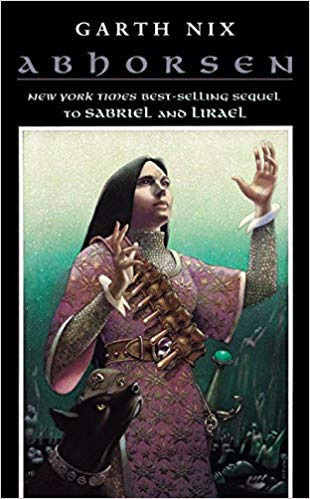
The Bell Jar by Sylvia Plath: I first read this in sophomore year of college and it was at the same time I got The Virgin Suicides. I really liked it the first time I read it because there was a lot that I could identify with and I thought it was very well written, however I recently reread The Virgin Suicides and hated it. I thought I was going to end up hating The Bell Jar too, but I wanted to give it a try before unhauling it, and I'm glad I did. There is something very thought provoking and familiar about story. The protagonist, Esther, struggling with her identity which leads her into a depressing downward spiral, is something I can personally relate to, but I like how Plath tells the story as well. She has a sort of dry, precise writing style which I normally don't like but Plath also seems to be sure to have that raw, emotional element to it. The story also had a realistic feel to it, not just in the subjects that it deals with but also in the ending. There are some books I've read where things just seem to get suddenly better at the end so that everyone gets a happy ending, but it doesn't feel realistic because it just suddenly happens with no build up or long term effort to fix the initial problem. In The Bell Jar the ending is rather ambiguous, with the audience being unsure of where thing actually stand for Esther and if she'll actually be released from the pysch ward. I will say that this book is pretty depressing and is full of trigger warnings. Esther's story was sad enough before she went to a mental hospital, but then things take a grim turn when she is constantly subjected to electro shock therapy. Again it's a depressing story but I do think is worth it if you can handle it. It's a modern classic for a reason, and while there are some dated aspects of the story, the overall theme and feel of the book is timeless. The Bell Jar received 4 out 5 stars.
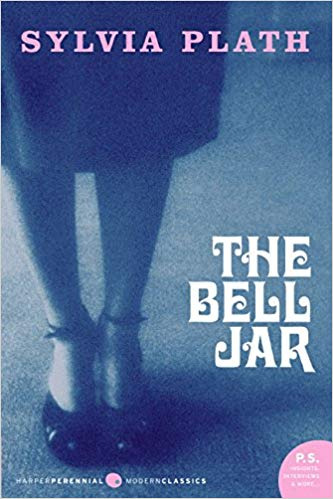
Little Women by Louisa May Alcott: This is a classic that I had never read. I grew up on the movie version of this book, but my sister read it when she was young and loved it, and as the years passed I felt this pressure to read it. I finally decided to pick this one up since I want to read more classics this year and there were several PoPSugar 2019 Reading Challenge prompts that this fit. I had a hard time with it at first for a few reasons. The language was a bit off putting, the March sisters felt immature and annoying at the beginning, and I had the movie version playing in my head the whole time. I really liked the movie and while the book is similar there are a few differences and some things are gone into more detail. It took awhile to get into the book, like I was so tempted to quit it, but I pushed through and by the second half things improved. In the second half they start feel more like mature women who are leaving their childhood's behind to manage their own lives. Each still having a distinct personality, but they come across as more complicated than they did at the beginning of the book. Meg dealing with a married life, and while not being as wealthy as other girls, she's happy and never far from home. Amy, who went to Europe, still enjoys luxuries but seems to understand there's more to life than that. Jo becomes a responsible woman, understanding herself a bit better but never losing her fire. It's a story that you have to get the full thing in order to appreciate it. It has themes of wealth and poverty, family, growing, and love, all being well done but again the payoff doesn't really come until later. The sisterly bonds I really liked seeing because I don't often read a book that does a good job of portraying sisters in a realistic yet positive and loving light. I will admit I had mixed feelings about all the romances. Meg and John's is cute and while it isn't my favorite I do like that we see them struggling in their marriage at times, yet always overcoming it. Amy and Laurie's romance was always my least favorite one in the movie because Amy is my least favorite character. In the book I can appreciate it a bit better because they both clearly try to better themselves to be worthy of the other (still don't love it though). Jo and Professor Bhaer are my favorite relationship in movie, like I tear up at the final scene when she asks him to stay. I think that they are so well suited for each other, and he really represents how much she has grown as a character. In the book though, I didn't really get emotional over them. There was still the same scene at the end that I loved, but most of the differences between the book and the movies involved their relationship and the timing of when certain events happened, and I just prefer how it's done in the movie. As more time passes I appreciate the book more and more, I think because the whole story was well written, despite the long and difficult beginning. It's a coming of age classic that I would recommend to anyone, but to young women in particular. Little Women received 4 out 5 stars and was my pick for the PopSugar prompts “book becoming a movie,” “book with 2 word title,” “book that includes a wedding,” and “book about family.”
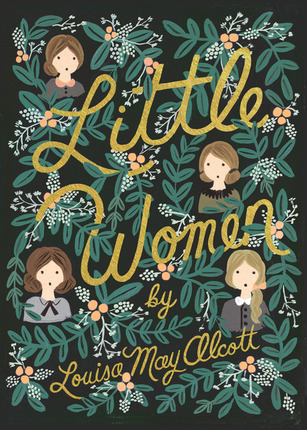
An Alchemy of Masques and Mirrors by Curtis Craddock: I went into this book expecting it to be a great story because I heard a lot of key things that made me think I would love it. A deformed princess whose best feature is her brain, I always love intelligent heroines. The prominent relationship would be the friendship between the princess Isabelle and her loyal body guard, Jean-Claude, and while awesome female friendships are my favorite relationships to read about, I always love a platonic male/ female friendship. Isabelle being shipped off for a political marriage, and last year I realized that arranged marriages that turns into real love and partnership is something I really like. A mystery with political intrigue, and I love stories with political intrigue. There's also sorcery next to steamships. Basically everything I heard about it made it sound like it would be something I loved. Once I read the book, though, it wasn't exactly what I expected. All of the stuff that I had hoped for was there, but it wasn't utilized in the way I wanted them to be. Isabelle is smart, she writes mathematical papers and speaks a language that is forbidden to women, and this is shown and made useful a few times in this book, but there other things about the people around her that she didn't pick up on that should have been obvious. That can be blamed on her harsh and isolated background both because of her deformity and the shear cruelty of her family, which is something I see a lot of in fantasy. Having the main character come from an abusive or neglectful family is a stable of fiction that I would like to stop seeing so much of. I do like that their was the father/ daughter dynamic between Isabelle and Jean-Claude, but it was just kind of there and I don't feel like I got enough development of it. I was also a bit underwhelmed by Jean-Claude as a character, because he pretends to be drunkard (which he only keeps up for less than half the book) but is actually a highly skilled musketeer with a strong sense of nobility. I didn't think there was anything fun or interesting about him. I thought that he was a pretty flat and shallow character, and he was so slow to figure out who was behind everything that it really makes him seem almost incompetent. I like the relationship for what it is, but I don't get a sense of history or devotion between either of these characters. Onto the potential romance, I liked that Isabella's worried about both her political standing and what her would be husband will think of her, since everyone but Jean-Claude sees her as an inconvenience at best. The fact that she keeps wanting to communicate with him before seeing him, but he takes no initiative to do that, does help build up the tension. Upon their first meeting at a masked ball though, I wasn't feeling any chemistry between the two. I won't reveal the twist at the end, but I will say Isabelle and her fiance are suddenly very close by the end of the book and it makes no sense. Like they knew each other for a short time, not even a full week, there was hardly any dialogue between them, and yet they are acting all lovey dovey and it just doesn't make any sense and I feel zero chemistry between them. Like the I shipped them more before they met, which means I liked the potential of the relationship much better than the actual relationship. The sorcery and steamships are two distinct pieces of world building and while I liked both overall, I had separate issues with them. The steamships are central part of the world because the kingdoms are all on floating land masses, so while it's important and fun to see something like that in a fantasy, I was a little thrown off by it at first, and it took about a quarter of the book for me to fully understand that piece. The sorcery bit of the world I really, really liked. There's the Sanguine's, which is a type of blood magic seen Isabelle's native court, and is indicated via red shadows. Then there's the sorcery in her fiance's court, which I believe was called Glasswalking, where one can walk through mirrors, and it's indicated via silver eyes. There are other abilities out there, and they are all tied to the history of royal bloodline and great deal of effort is put into preserving these bloodlines. Each ability was distinct and I loved the detail and technicality put into each one. Sometimes these abilities felt like plot devices and were used in a way I didn't like, and I also wished I could have seen more of them rather than just the 2. Lastly, and probably my major issue with the story, was the narrative itself. As I stated at the beginning I went into this expecting it to be a mix of political intrigue and mystery, with the mystery aspect being more of a side thing. Any political aspect of the story was sacrificed for the sake of furthering the mystery narrative, which might have been okay if the mystery was good, but it wasn't. I guessed who was behind the whole thing before either of the characters did. I thought for a mystery it relied on several overused tropes, which again made it feel so obvious, and I thought the villains whole motivation and plan wasn't good because 1) it was insane and was never going to work and 2) the first book of a series is not the place to be putting stakes that were as high as they were. There were several enjoyable aspects of this story, but ultimately I thought it was underwhelming and disappointed me in almost every way. An Alchemy of Masques and Mirror received 3 out 5 stars from me.

The Nowhere Girls by Amy Reed: I had this one on my TBR shelf on Goodreads for awhile, and while I was intrigued by the premise, I kept not picking it up. This month I had to read it since it was chosen by someone else to be the book I read, as part of a monthly reading challenge group. The book met my expectations of it, I'm glad that I read it. The premise is that new girl Grace sees messages written into the walls of her bedroom, and when she asks about it she learns that the girl that previously lived in that room was gang raped. Instead of having the boys face consequences, the whole town pretends it didn't happen and label her as a slut, including those that believed her. Grace and her new friends create The Nowhere Girls in the hopes that this will change things for the better for the women of the community, then things take off from there. The story follows mainly 4 POVs. There's Grace, a chubby girl with a religiously liberal mother, and Rosina, a queer punk Latina, and Erin, a girl with Asperger's Syndrome who enjoys Star Trek. I was a little surprised by the diversity in this book because all 3 of these girls are ones that I don't really see as protagonists, especially in YA contemporary, and I while I was glad to see that kind of diversity, I loved that these girls were more than just their labels. The 4th POV is titled Us, and in those chapters we actually get snippets of multiple perspectives of unnamed people (though some you can guess) just going about life, and what I loved about these sections was how it highlighted not only the flaws in our society, but also how simultaneously simple and complicated life is. The girls friendship is nice, but I just don't feel like there was enough depth and development for me to be fully attached to it, which was a bit disappointing. The romances were all really cute, each one having their own ups and downs, but I liked that they were kept a minor part of the story. All the girls struggle with their relationships with their parents in various ways, and that's something that I didn't like about the ending. For 2 of the girls, their relationships just seemed to get fixed with very little discussion, which felt too clean and unrealistic, and the other one's parents are completely absent from the second half of the narrative. The only two complaints I have about this book is that I wish the friendships could have had more depth and development instead of just being there, and I also didn't like the ending. I'm glad it ended on a positive note, that's what I need with these kind of narratives, but everything to just suddenly get fixed and the readers are rushed into a clean ending of a messy, underdog narrative. That being said I still liked this book and think it's a good book that discusses rape culture (that being said there are trigger warnings for sexual assault). I don't know if it will be one of favorite YA contemporaries, but it was a highlight of this month and is definitely more along the lines of the kind of contemporary I want to read. The Nowhere Girls received 4.5 out 5 stars and was my pick for the PopSugar prompt “a book with multiple POV's.”
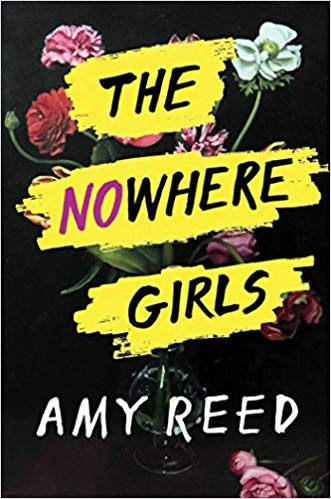
Twilight by Stephenie Meyer: Based on my reading preferences, Twilight is not something that I would have any interest in picking up, in fact it's the exact opposite of that. So why would I read it? I've held onto the entire Twilight series for so long and as I'm trying to tackle my rereads it's just standing out to me. I know I'll probably get rid of it but I haven't read them since middle school (and I graduated from college so it's been about 10 years since I've read it) and I wanted to read it and form my own cohesive opinion. Upon rereading it I can clearly see that Edward and Bella's romance is pretty toxic. I was also surprised by how terrible Bella, like I had heard multiple times how flat she was, so I was excepting a really bland, passive character. While she was definitely that, she was also a whiny, bratty character that I really hated. She's supposed to be very plain, but all the boys are instantly attracted to her. Of course she looks down on all of them until she sees Edward who she immediately becomes obsessed with. She also looks down on the other human girls, and the series does a poor job of portraying any female that doesn't like Bella as either bitchy or slutty. Bella is a character that we are being forced to like, not due to her on merits and traits (with her only trait being clumsy), but by having everyone fawn over her and seem beneath her. The writing was also bad. The sentences were choppy, for lack of a better word, and it didn't feel natural. While reading it I thought that this was something I would expect myself to produce in a high school writing class. It read as very amateur and unedited. This entire series is about a romance between a high schooler and a vampire, and there is so much wrong with. It almost symbolizes being in relationship with a bad boy with a nice streak. He works hard to be good, but there's always the threat of him doing serious damage. For whatever reason this isn't a deal breaker for Bella. Neither is the fact that he's several years older than her, stalks her, watches her sleep, and is rather possessive of her. At one point he even calls her heroin, which is not something I would want to be compared to because it's a toxic drug that kills people. I don't really understand Edward's obsession with Bella either because other than his inability to read her thoughts, there wasn't anything compelling about her. Despite the abysmal romance, protagonist, and writing, this book managed to have a few surprises to it. First I liked learning about the Cullen's different backgrounds, and that remained true through the series. Alice being a mental patient who had visions when she was human, and being the only victim that escaped James, was an interesting part of her back story that wasn't included in the movie. I forget if it was in this book, or one of the later ones, but Edward tells Bella that a vampire's abilities are reflective of their human personalities, which is kind of cool. What drives them together and makes them so close is that they strive to be better and not hurt humans. The Cullen's had a really nice familial relationship, which is more than I can say for Bella and her father Charlie. Second is once the action did pick up, with James hunting Bella, I did like that. It made it easier to fly through the novel, and other than the romance, was the overarching conflict for the first 3 books (though it really could have been 2) but I liked that there were long reaching consequences based on this event. I still don't really get why Bella wasn't made into a vampire at the end of this book, since the venom was in her. It's hard to predict what the rest of the series would have been like had that happened, but I like to think it would have been better, a more equal power dynamic between Edward and Bella. It's easy to see how iconic it is an the influence it has had, but I also think it's very much a product of it's time. Twilight received 2 out 5 stars from me and was my pick for the PopSugar prompt “a book with 1 million ratings on Goodreads.”
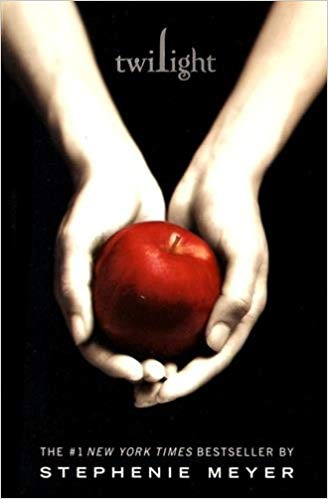
New Moon by Stephenie Meyer: After finishing Twilight I was so on the fence of if I should read the rest of the series, but I ultimately decided to continue on with the rest of the series because I know I'll fly through them, and I did. I finished New Moon in one day. Going into this one I knew it was going to be my least favorite, and it definitely was. I had only 8 tabs in this book that's over 500 pages, and 5 of those tabs were for stuff I disliked. First there's Bella being depressed about her birthday because that means being older than Edward. It could make for an interesting discussion about mortal/ immortal relationships but in this case Bella is just being over dramatic. Her desperation to become a vampire so she won't be older than Edward makes no sense. She's turning 18, not 30, and she's still in high school so she's still fairly young. Also it's okay for a woman to be the older in the relationship. The toxicity of Bella and Edward's relationship continues, in this one it's emphasized how neither can live without the other. Edward says he'll kill himself if he can't live without Bella, breaks up with her, than due to a misunderstanding he really does try to put himself in a situation where he will get killed. It's even worse on Bella's side because for the 3-4 months that Edward is gone, she's basically a zombie. She's completely become a passive blank slate that ignores all her “friends” yet refuses to move on, even when her dad tries to help. It's either that or she's doing reckless things because that causes her to have visions of Edward, which she considers a good thing. The only thing that partially brings her out of it is her friendship with Jacob, which I'll get back to in a minute, but in the end Edward and Bella are reunited, and Bella completely forgives him and starts functioning like a normal human being. This makes it seem like Bella's entire existence revolves around her 100 year old vampire boyfriend, which is not only unhealthy but also makes for a lousy character. Back to the Jacob thing, I liked Jacob before his werewolf transformation because he seemed like a chill guy that really tried to help Bella, without any romantic hintings. Then once he became a werewolf, things went downhill. Despite knowing that Bella knew about the vampires, and how much she needed him at that time, he went for weeks not talking to her, or coming clean about the werewolf thing. Based on stuff in the later books I really think he went downhill as a character once he entered the paranormal, but I also disliked the werewolf thing in general. It felt like it was put there just to have something to oppose the vampires, even though there never is an actual conflict between the two, and create the love triangle between Jacob, Bella, and Edward. We do get introduced to the Volturi, who are basically royalty of the vampire world, and that is as close this series gets to world building. This entire book focused on a toxic romance, and didn't really have any action to it, so it had fewer positive attributes than the previous book, which made it difficult to get through but the length and bland story and writing made it possible to finish this in one day. That and I was determined to get this book done as quickly as possible. New Moon received 1 out 5 stars from me.
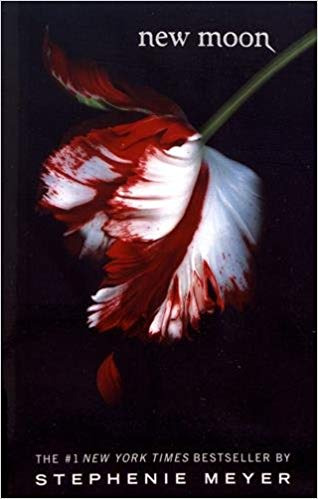
Eclipse by Stephenie Meyer: The biggest complaint I have about this one was the absolute lack of action and how Bella is such a martyr. Both have already been clearly shown throughout the series but I want to talk about it in this one because I think it was the worst in this book. First is the lack of action, which is a stable of this series. Like you usually don't get to the action bits until the last 20% of the book, because the first 80% focuses on the romance. The second book really didn't have any action at all, but I didn't expect it to because I remembered the movie. As I was reading this one, I know it's building up to the big fight between the Cullen's/ werewolves and the new born vampires. We see that in the movie and get to witness some of this battle. That doesn't happen at all, there's just the brief scene with Victoria than we fast forward to after the battle. That was disappointing, because I was waiting for the action bits, and they never happened. This series focuses so much on the romance, which I'm not crazy about in the first place, but when it involves bland characters and toxic elements, that makes the entire plot insufferable and feel like filler material. Onto Bella being a martyr, that's been shown again and again. This series spend so much time emphasizing how special and pretty she is, but the majority of the time she comes off as a bitch. She tends to disregard her human friends and even her own father in favor of Edward but as soon as someone wants to kill Bella, she insists that efforts be put into protecting everyone but her. I think this is done just to portray Bella as a selfless and pure individual but instead it makes her seem stupid and have no survival instinct. I also hated the whole concept of imprinting because it's the sort of love at first sight, soul mates trope that I despise seeing in any narrative. There's something about the imprinting that takes it to a new, gross level but I'll discuss that more in my Break Dawn review. There was also a scene where Jacob kiss Bella without her consent, which made my already dwindling opinion of him plummet, but Bella punched him in response, which was good. Highlights of this book is Bella's sort of friendship with Angela, it's nice to see her around someone that is a regular human, wish there had been more of that. Also learning more about Rosalie and Jacobs back story added to their character and portrayed them in a new light, both tragic in different ways. Putting a background to these side characters is the only way they seem to get any sort of development, yet that little bit makes them more interesting than Bella, who's the main character. It's also interesting how many literary nods and parallels there are throughout the series, with the most prominent ones being famous tragic love stories, like Romeo and Juliet and Wuthering Heights (the latter of which I hated). Eclipse received 1 out 5 stars from me.
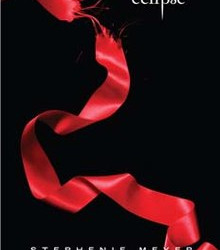
Life As We Knew It by Susan Beth Pfeffer: I first read this back in high school, and actually reread it a few times. I was a bit worried before reading it again that I wouldn't like it because of the main character being a teenager, but that was something I ended up appreciating. The characters all feel very human, flawed but trying to do what they think is right. This also comes across in their relationships, as we see the ups and downs, particularly Miranda's relationship with her mother. Miranda is a fairly typical teenager, she has a few friends, she likes boys, has some hobbies, and can be petty, but she's ultimately a good person that wants to see her family survive. I liked the diary written format of the narrative because it had a more personal feel to it, but I think was the appropriate format for a quieter apocalypse story. Something happening to the moon isn't a new concept for science fiction stories, but this usually creates some sort of epic plot. That wasn't this case in this book. Instead we get a year long story of 1 family trying to survive as the Earth becomes a more hostile environment, and there's progressively stronger feeling of isolation (due to both the amount of people dying or leaving but also the open, rural environment and Miranda's family being crammed in their house when the winter comes). That almost makes the story feel more realistic because everything that happens in this book is something you can easily picture actually occurring if this were to happen. I do wish that there had been a little more character growth, and I'm not sure if soft apocalypse is the kind of apocalypse narrative I like reading about, but it is still a quick enjoyable read. Life As We Knew It received 4 out 5 stars and was my pick for the PopSugar prompt “a climate fiction book.”
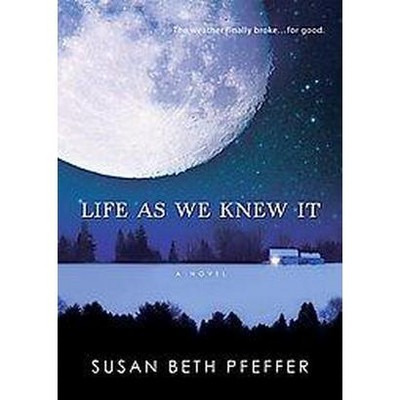
Breaking Dawn by Stephenie Meyer: By the time I got to this one I was so wiped out by the rest of the series and just ready for it to be done. There isn't much to say about this one that I haven't already said about the previous ones, but there are some things I definitely need to talk about that were present just in this book. The first I'm going to talk about is something I alluded to in the Eclipse review, and that is the fact that imprinting seems to excuse pedophilia. There was already Edward, who's about a hundred years old, but is interested in a 17 year old high schooler, but in Eclipse Jacob tells Bella that one of his friends imprinted on a 2 year old girl. Gross! Then in Breaking Dawn, Jacob imprints on Renesme, Bella's half vampire daughter within minutes of her being born. I never liked this because 1) It's just yuck 2) It made Renesme feel like a prize since Jacob couldn't get Bella. I actually skipped over most of Jacob's POV chapters because I was really bored by them and there were only 2 major thins that happen in them. Him splitting from the pack and forming his own, which didn't happen in the movies, and Bella giving birth to Renesme, which is in the movies. The other thing I really disliked through the whole series (besides the romance) was Bella. I already discussed how she's such a martyr and the entire narrative takes the time to make her this plain but special person. I think it's most obvious in this book because of 2 things. The first is her ability to shield, which someone points out is a rare ability among vampires, so rare that it didn't have a name until the 4th book. I will that her ability is reflective of her personality, being unable to read her thoughts because she's basically a blank slate. The other special snowflake scene was when Bella first goes hunting as a new born and she smells human blood but is able to resist the urge to drink. Afterwards everyone is just amazed and proud of Bella for being able to do this, and I might have actually rolled my eyes at this scene because I was sick of the entire series beating you over the head with how amazing Bella is at the expense of other characters. Another minor thing I want to talk about briefly that bugged me, and that is when Bella is first comes to the conclusion that she is pregnant it's because she's 5 days late. I get that a late period is a likely sign that you're pregnant if you've had sex recently, but it's not a guarantee, especially if it's only a few days late. Menstrual periods are not something I see often in books, but there are even fewer instances where I think they are well done within the narrative, and this isn't one of those cases. I'm walking away from this series glad that I read it, but I can't say I enjoyed it or recommend it. There was a lot of wasted potential, with characters, relationships and morality, but all of that was pushed aside for a crappy romance, and that was the biggest tragedy of this series. Breaking Dawn received 1 out 5 stars and works for the PopSugar prompt “a book with a wedding,” since the big event in the first half of this book was the wedding.

The Dead and The Gone by Susan Beth Pfeffer: This is the follow up to Life As We Knew It, and is set in New York City, revolving around Alex Morales and his two younger sisters as they struggle to survive when the moon is pushed closer to the planet. It manages to distinguish itself from the first book, but I didn't like it when compared to the first book. There's the characters, Alex and his sisters, Briana and Julie. I'll admit Alex is under quite a bit of pressure having to suddenly being in charge of his sisters during the apocalypse because his older brother is on the other side of the country and his parents are most likely dead. That being said, I can't think of anything that he did right or handled well. He seems to keep himself as unaware as possible, waits until the last minute to take any action to further their survival, doesn't help his sisters with any of the house work, and constantly yells at or talks down to his youngest sister. It's hard to be sympathetic toward him because he doesn't mature or change despite how detrimental his actions are, and he pretty much relies on entirely on other people in order to survive. I didn't even really enjoy any of the other characters because I either didn't know enough about them or I didn't like what I saw of them, which mainly applies to Alex's sisters. The older of the two, Briana, is very much a Beth from Little Women, where she's sickly but just “too pure for this world” and her sheer goodness mixed with denial of the harsh realities is what made her irritating for me and what ultimately lead to her demise. The youngest sister, Julie, has a lot of spunk but due to her young age (12) and Alex's bad attitude toward her, she comes off as a brat more often than not. To her credit, I think she improved the most over the book, but she still didn't reach the level that I hoped she would. The characters from Life As We Knew It just felt more complex and changed as the book progressed, where the characters in this book were either flat or unlikable. I will say I liked Alex's friendship with Kevin because that was something I wanted more of in the previous book and it was a nice surprise, that gets taken away about ¾ into the book. My biggest issue with this book was that I wanted more from it and it just wasn't delivering. The previous book was quieter because it was set in a more rural area, but it still had this harrowing feel to it. This one is set in New York City, and because it's a big city that's close to the ocean (the complete opposite of the previous book), I though the story would be more grim and the setting would be much grittier. In part due to the narrative and in part due to Alex's sheer ignorance, I didn't get any sense of identity from the city nor did I really get a sense of how desperate people could get to survive. Another thing I also think had potential but didn't take it far enough was Alex's morality. His family is devoutly Catholic, again quite different from the first book, so he goes to a Catholic school and mass every Sunday. I thought this would be a great way to bring up the topic of “Bad things happen in the world, how do I hold onto my faith,” or “I've done something bad, now I'm struggling with my morality.” There's only one small scene that addresses those kind of issues. Anything else is just people telling Alex to let go of his pride, and then him brooding about but not doing anything. Essentially this book took annoying characters and made them do the same thing until the end of the book, and normally I would get frustrated with that but I wasn't invested enough in the character to do that. I still think this book was decent but I don't think it was as grim or complex as it could have been, and I just didn't care about any of the characters. The Dead and The Gone received 3 out 5 stars from me.
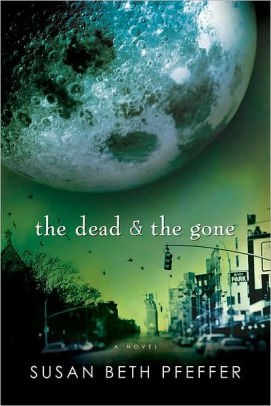
Within the Sanctuary of Wings by Marie Brennan: The final book in the Memoirs of Lady Trent series, I was admittedly a little worried about this one because it's a series finale and I was a little disappointed by the previous 2 books. I do think it improved but I still think it's a disappointment. It's a book that crammed literally years worth of plot into a 450 page story, and the plot isn't the only thing that is glossed over. Isabella's a great character and I loved her passion, her ingenuity, and her growth over the entire series. In this book, I don't think her character underwent any kind of growth, and even her other core aspects aren't really displayed in the story. Yes, her passion for dragons is what drives her to go on the expedition in the first place, but that's it. And while she does have to use her intelligence to communicate with her rescuers, we're honestly told more than shown. There's also her relationships, which are just kind of there but don't do anything. She is very open with and supportive of her husband Suhail, and he supports her in the expedition because he wants her to get the academic credit that she thinks she deserves, but that's all there really is to their relationship. There was a lot more effort put into them becoming a couple rather than them being a couple, which I'm not a huge fan of. I don't mean to bash this book, I did still give it a good rating, but coming away from this book it just felt a rushed and there a couple of convenient plot points that I don't think were well done. As a series finale I have mixed opinions on it. I was spoiled for the big reveal half way through the book, so it didn't have the impact that I would have liked, but it was good series climax. I think I'm so used to epic series, with epic finale's, that it's an adjustment reading a quiet series finale. That being said I don't think the finale did the series justice because there wasn't any further developments to previous established parts of the series, I still don't like the lack of female characters, and the pacing made it come off as a series that just wanted to be finished. I do think the Memoirs of Lady Trent is a good, quiet fantasy that I would recommend, but I don't think this book lived up to what the previous books had set up and I ultimately come away from it wanting a little more. Within the Sanctuary of Wings received 4 out 5 stars from me and was my pick for the PopSugar prompt “a book that features extinct or imaginary creatures” since it's all about dragons.
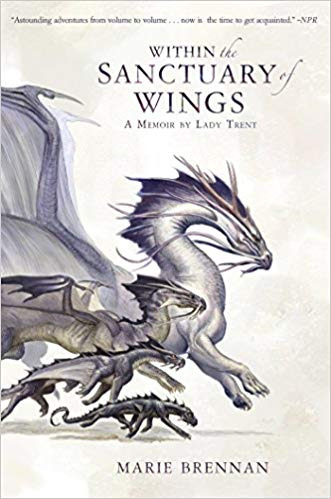
Thank You Everyone
Keep Calm and Keep Reading
#monthly wrap up#january#twilight#stephenie meyer#abhorsen#garth nix#the nowhere girls#amy reed#little women#louisa may alcott#the bell jar#sylvia plath#memoirs of lady trent#marie brennan#last survivors#susan beth pfeffer#an alchemy of masques and mirrors#curtis craddock#books
10 notes
·
View notes
Note
Hey Zal, I went thru the archives but haven’t seen whatI was looking for. Could you do a post on how Goblin & Buffy did a good job showing immortality vs. humanity whereas TVD failed ?
It’s interesting to answer this kind of ask in the midst of the debate that’s sort of happening with me and followers about TVD and daylight rings because with BTVS, I mean, the show isn’t flawless but one of the ways Joss and the writing room encapsulated immortality well through the lens of vampirism is that they created a culture. It’s not as consistent or prevalent or detailed as True Blood but there’s still a culture.
Like if daylight jewellery in TVD is non-transferable and can be only linked to a single person then that should be played up more instead of it just being a piece of jewellery that keeps them from being burned, it should have a lot of importance for a vampire, it should be like a part of the vampire, it should be something very personal and the only time it’s ever sort of shown that it’s personal is when Kai melts Elena’s but the sentimental value is related to Stefan not the fact that it’s a part of her.
In BTVS they don’t have that but they have a world, they have a culture that is rooted in how long they’ve been alive

Like from this entire exchange, the viewer understands that every vampire says that they were at the crucifixion in order to seem venerable, in order to seem ancient, in order to seem powerful.
Even Mr. Trick, one of the most underrated BTVS characters I think, when he thinks the Mayor is going to tell him to leave Sunnydale he brings up how he’s always been unwelcome in the community and that the speech got old long before he became a vampire thereby bringing up a legacy on anti-blackness that he had to live through as a black vampire.
On a more comedic note, when we’re introduced to BTVS in the pilot, Buffy can automatically tell who the vampire in The Bronze is because their clothing is out of date.




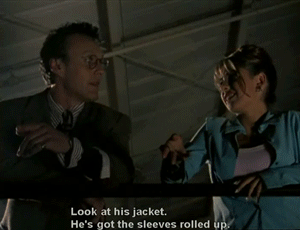
On the flipside of that, Giles shades both Angel and Spike for only being a couple centuries old, their age isn’t actually what makes them unique within the context of demons and vampires and monsters, it’s the fact that they’re both supposed to be unusually cruel.
And the concept of immortality and vampirism is brought up quite consistently and how it actually isn’t all that it’s cracked up to be

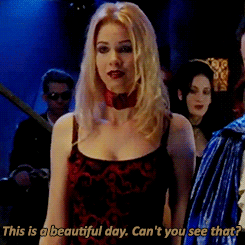

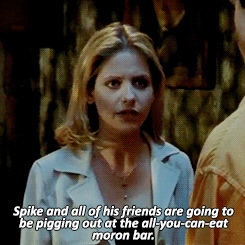
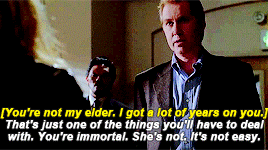



because vampires aren’t people




With Angel, his age is constantly brought up

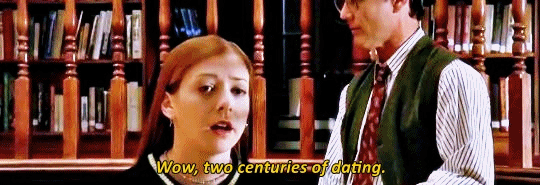

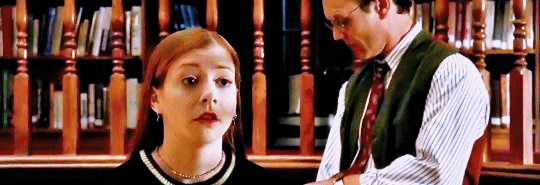

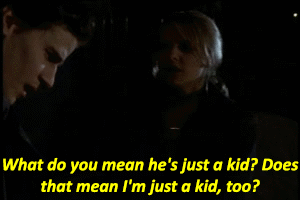
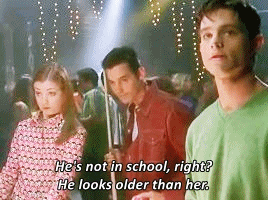

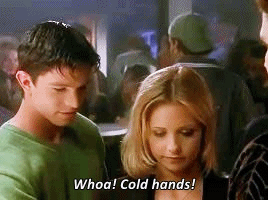
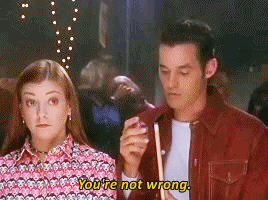
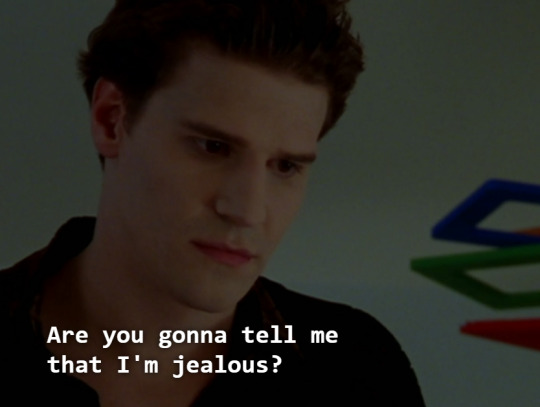
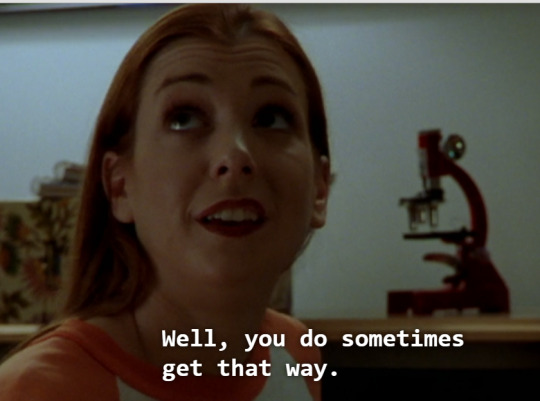


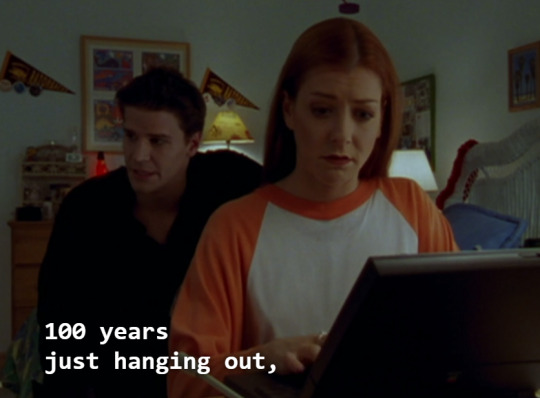
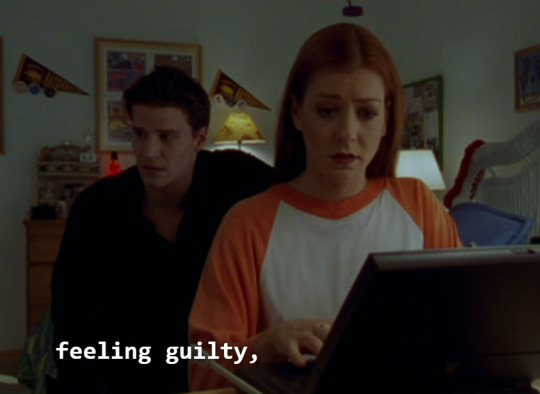

One of the Halloween episodes is dedicated to Buffy having a romanticized idea of what women were like when he was human and being transformed into one

The age never goes away, the fact that they’re from a different time, that they’re not human and that they’re old never goes away, you never forget that.
With TVD, it’s mentioned once or twice and it feels like a checklist, like Caroline brings up the fact that Stefan is still going to be hot when Elena is old and that happens once in 2x04, in 2x20 Stefan talks about how sadness can turn into despair and it’s hard keeping your switch on when you feel everything so deeply. And yet Jeremy and Ben and other emo, angsty humans wanted to become vampires to shut everything out but then we find out that you can never really shut out your emotions as a vampire so is that the big secret about vampirism then, is that the big weight of immortality, that you feel? OK but so what? What does the show do with that? Humans feel and vampires feel and ... ... ... ....
With Goblin, I find that it’s more in the physicality and the reactions that Kim Shin and Reaper have as well as the reactions to the both of them. You can feel the weight of their conditions and their immortality through how they navigate the world.
One of my favourite examples of this is when Reaper finds out that he’s actually Wang Yeo because his response is chaotic, he’s crying hysterically, he throws things off the table, his pain is fresh because his memories are fresh:
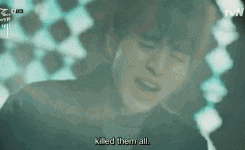
And then it cuts to Kim Shin who is just sitting there quietly in despair because he has been living with the memory of what Wang Yeo did to him and his family for 939 years and it’s not fresh and it’s not new, it’s an anchor that’s been dragging behind him for his entire existence so he’s just like
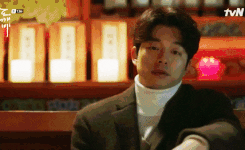
but that’s not always how he deals with being alive for so long, his reactions to things are erratic and shift
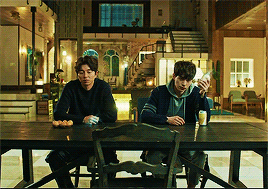
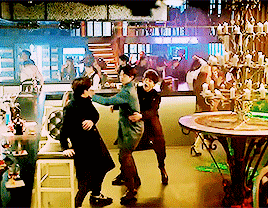
And he consistently visits the people in his life who have died and on one of the tombstones his own picture is there

and when Sunny figures out that in her past life she was his sister she wonders aloud how come it doesn’t feel like a memory for him, how come he’s acting like his life continued since the tragedy

and it’s because it has so he has nearly 1000 years of rage and sorrow so when he hugs Sunny, it’s like he’s holding his sister from a millennium ago and he reacts that way
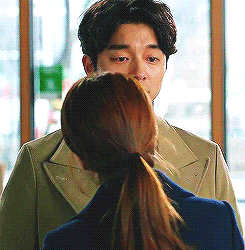

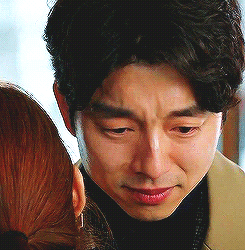
to the point that Sunny has to remind him that she is not Kim Sun (his sister), she is still a different person with her own personality.

There are even small details such as the fact that Eun Tak asks him what his actual name is and he has to change identity every so often


or sometimes Eun Tak or Deok Hwa will listen to him speak and ask why he’s talking like he’s in a historical drama (and this never happens with TVD. Once in 1x04, Stefan speaks more formally and Elena kind of gushes over it but their speech is never confused, there is no wonder or awe about watching the world change around them)
Modernity is often mentioned

historical figures are often mentioned
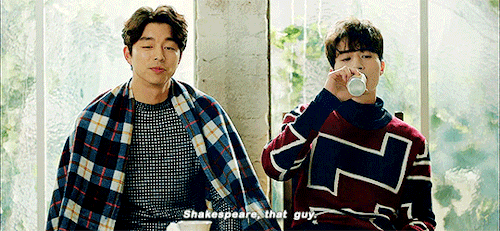
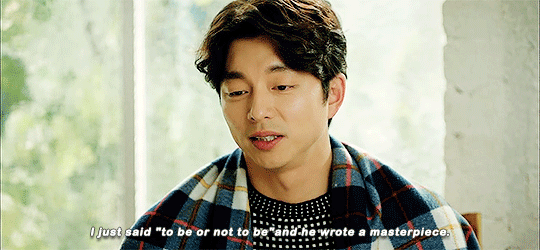
time and age are mentioned


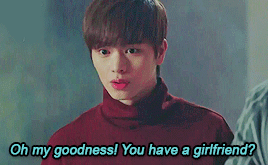
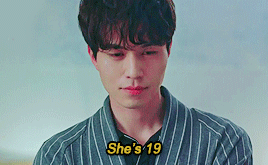

When he comes back from the in-between world, it’s in the clothes he died in from the Goryeo era

and when someone he loves dies, which always inevitably happens, Eun Tak empathizes with the amount of death he would have to endure in a lifetime of immortality
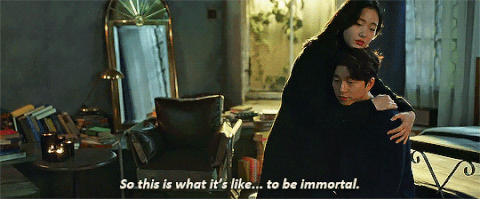
With TVD, we could’ve done this because season 1 had the beginnings of everything I’m mentioning and then they never followed through on it.
Like Stefan goes back to high school for Elena, I get that premise and they have Damon say a couple of words about him joining the football team but if we actually saw how bored Stefan was interacting with vapid teens when he’s been around for so long, it would not only endear the SE narrative even more to its shippers because he’s suffering through mundane ongoings of high school for her being over 100 years old but it would also reiterate the fact that while he is 17 he also isn’t 17.
Even during the double date, it would’ve been cool if Caroline and Matt remarked at how calm Stefan is being throughout the entire night because it’s all pretty high school. Caroline is putting Matt through a test to see how over Elena he is, he mentions making out with Elena in a sports car so Caroline gets irritated, Elena is doing the friend duty (poorly) by seeing if she’s OK, Matt’s like oh shit my bad, and Stefan is being incredibly mature for a 17 year old in the situation being like, you guys have a history it does no one any favours to ignore that. I’m not saying teens can’t be mature for their age but THAT mature in this situation, that should’ve had Matt be like … …. wow, you sound like a grown up?
I remember a while ago we were were discussing on this blog that Klaus is legit 1000 years old and he doesn’t come across as 1000 years old, he’s way too well-adjusted, there is nothing to suggest that he’s been around that long, like Shin is tired and spends time just drinking because he is SO exhausted

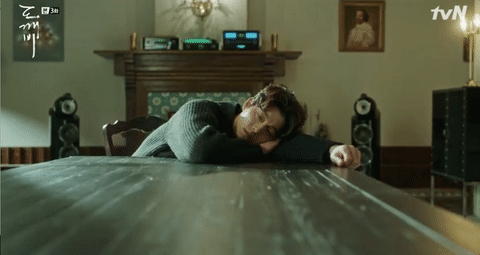

and yet when the possibility of him dying comes up his reaction is strong
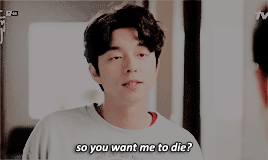

and TVD vampires aren’t provided with this kind of nuance when it comes to immortality and the amount of time they’ve been alive, they’re just OK and if they’re not OK, if it’s Damon yelling about how he misses being human so much he can’t stand it,
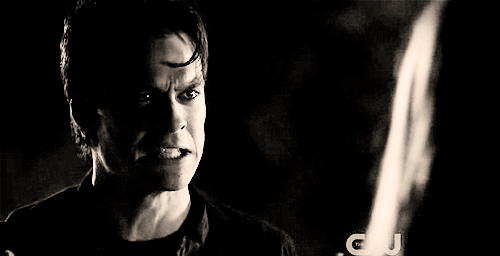
the show hasn’t done anything to substantiate Damon’s claim.
I understand why Stefan would miss being human because Stefan is the only vampire where vampirism is actually seen, where hunger and blood and despair and darkness actually manifests
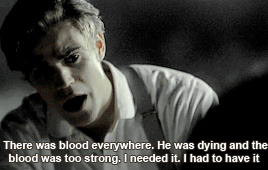
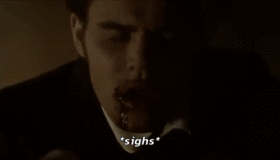
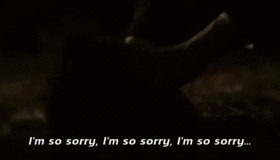



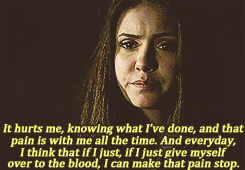

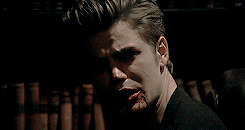

so I can see why he would want to be human but why would Damon in that moment? With Goblin, we see the sadness and depression that comes from the fact that everyone around Shin dies and that Wang Yeo is a Grim Reaper so his job is death, which is depressing, with Shin he’s still in the state of sorrow and rage because the person he served and loved massacred his entire family and he just wants the rage and pain to end, death is meant to be peace and life is meant to be a punishment
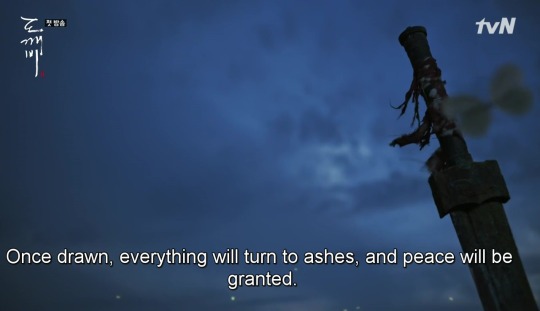
but with Damon everything is wrapped up in Katherine and Elena which doesn’t explain wanting to be human, it’s more about Damon’s choices in women, so it comes out of nowhere.
And of course that’s if we’re going the emotional route. Because I enjoy the way vampirism is portrayed in True Blood I usually draw comparison between the two of them because with True Blood it’s about losing their capacity for emotion through immortality

and it depends on the age of the vampire.
Godric is 2000 years old and just done with the world, he’s over it, it’s just time to die
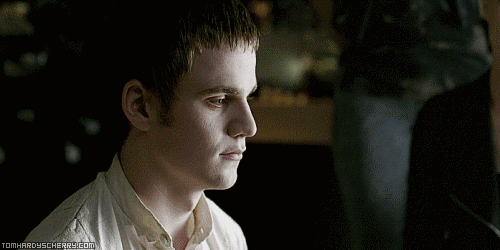

Eric is 1000 years old and is super uninterested and bored, nothing really excites him anymore (except Sookie and getting a rise out of Bill) but he’s not over living yet

Bill is over 200 years old and he’s doing his best to remain as human as possible
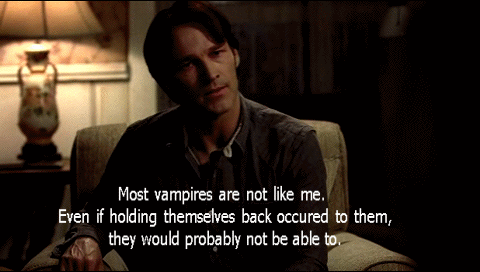

Jessica JUST turned and she’s in this everything is new, I’m going to live forever, this is awesome phase
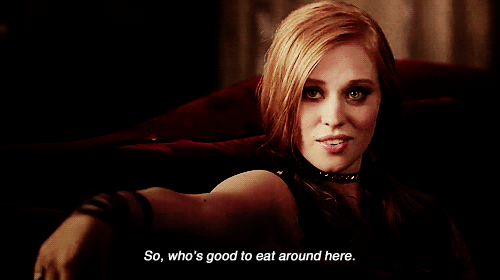
Then you have characters like Russell, I’m not sure how old he is, who just want to eat humans and subjugate the world to vampires

And then you have TVD where they legit just act like humans who sometimes have super neat tricks.
#goblin: the lonely and great god#the vampire diaries#buffy the vampire slayer#true blood#stefan salvatore#kim shin#wang yeo#angel#spike#buffy summers#stelena#kim shin x eun tak#eun tak x kim shin#kdrama
71 notes
·
View notes
Text
The Weekend Warrior Home and Drive-In Edition July 3, 2020 – HAMILTON, THE OUTPOST, JOHN LEWIS: GOOD TROUBLE and more!
Well, it is 4th of July weekend and in most years, I’d be scratching my head about how the 4th falling on a Saturday might affect the movies opening over the course of the week. This 4th of July lands just as a bunch of states start rolling back their reopenings, including some percentage of the hundreds of movie theaters that have reopened, not that any of them would have had much impact. Even so, there’s some great stuff hitting screens of all sizes including lots of stuff you can watch from home.

First and foremost, Disney has decided to release the filmed documentation of Lin-Manuel Miranda’s hit Tony-winning musical HAMILTON onto the Disney+ streaming service this Friday, months in advance of its planned holiday theatrical release, but appropriately, just in time for the 4th of July. I was lucky enough to see the musical on Broadway last year March, although by then, all the key players had pretty much left to be replaced by equally talented performers. I thought it was terrific, basically as good as everyone had been saying, but I was still a little bummed I didn’t get to see Miranda or Daveed Diggs or some of the others who had been in the show since it premiered off-Broadway.
Wisely, Miranda had one of his last performances in 2016 filmed and Disney bought the rights to release it theatrically before the pandemic hit. Obviously, Miranda knew that people were starting to go a little stir crazy from lack of entertainment and releasing Hamilton early for 4th of July weekend was a way he could give back to the fans, while giving people yet another reason to subscribe to Disney+ while there are no new ongoing series ready to go. (Apparently, Disney+ has shut off the one-week free trial so people don’t subscribe just to watch Hamilton and then cancel after doing so.)
In fact, I was quite surprised to get a screener for the movie to review it, although I feel that Hamilton is almost review-proof at this point, even in this new filmed format. I’ll admit that at first, I was skeptical that watching a live performance even on a very large TV set could possibly capture what it’s like to be in the Richard Rogers Theater on Broadway watching Hamilton live, but boy, was I wrong!
Since I had never seen Lin-Manuel Miranda in the title role, that was special in itself, but so many of the other performances just burst off the screen. Leslie Odom, Jr. is absolutely amazing as Aaron Burr, and I was equally blown away by Christopher Jackson as George Washington, a character I barely remembered from my one time seeing the musical. Renée Elise Goldsberry was also quite brilliant as Angelica Shuyler, the woman who had to compete for Hamilton’s affections with her own sister Eliza, as played by Phillipa Soo. (I actually liked the women’s numbers quite a bit more in this format, as Goldsberry and Soo were fabulous.) Apparently, they got Jonathan Groff back as King George for this performance, and he’s deliciously evil as the antagonist of the piece, despite making just three appearances more as a narrator.
On paper, Hamilton’s 2 hours 40 might seem long but the first act (about an hour and 17 minutes) just flies by based on the amazing energy coming off stage. The second half is very different, but it also switches Daveed Diggs over to the role of Thomas Jefferson, creating another stopping block for Hamilton. This is also where Hamilton goes deeper into the politics of the time, framing political debates as rap battles, and delivering some of its biggest numbers. Knowing how this musical helped turn Odom and Diggs into superstars alongside Miranda, it’s great to see some of their numbers that really show off their talent.
All of that said, it’s almost impossible to separate Hamilton as a filmed stage musical from Hamilton the musical itself, because there’s a good reason why it was such a blockbuster hit – because it so damn fucking good. Hamilton (the film) is an exceptional documentation of this musical, which will probably stand the test of time as one of the finest musicals from the early 21st Century. Whether you’ve already seen it or have been dying to do so, it is to Disney and Miranda’s credit that they chose to finally give people all over the world a chance to watch it over and over from home at this particularly difficult time in our country’s history.
Hamilton will also kick off a weekly “Summer Movie Nights” program on Disney+ which will begin this Friday with live Q n As on Disney+ social media (Twitter, Instagram and Facebook). Besides Hamilton, the program will also include The Mighty Ducks, X-Men: Days of Future Past, X-Men: Armageddon, Solo: A Star Wars Story and a lot more extending right through August. (You can read more about that program here.)

There are a number of other really good movies this week, but this week’s “Featured Film” is Rod Lurie’s return to filmmaking with the real-life war drama, THE OUTPOST (Screen Media), based on Jake Tapper’s book The Outpost: An Untold Story of American Valor about the 2009 assault on Combat Outpost COP Keating in a valley surrounded by Afghanistan’s Kush mountains that was overrun by hundreds of Taliban in one of the Army’s deadliest battles, the Battle of Kamdesh.
A little review caveat: I’ve known Rod for almost 13 years, and I consider him a friend. Heck, he’s bought me a few nice meals over the years, and he gave me some of the best advice I’ve ever been given in my entire life… which of course I didn’t listen to. Rod also knows that I take my role as a film critic very seriously, since he was one himself, and that I wouldn’t lie if I didn’t like a film he made. The good news is that I loved The Outpost, and I think it’s one of Lurie’s best films to date. (For those who don’t know this, Lurie went to West Point, and his earlier film The Last Castle was a good indication of how in tune he is with the military and how to portray them in film. Oddly, that movie was also the very first movie I ever reviewed, if that’s ever asked in trivia.)
Of course, there’s another immediate caveat that needs to be said, because The Outpost is coming out after a couple decades of movies set in Afghanistan, as well as some great war films. It’s something Lurie surely must have been aware of when deciding to tackle this subject matter, and that’s something the movie has to work against since to many, they’ll feel that Afghanistan has been covered enough. Watching the movie makes you realize this is far from the case.
Another general problem with military films is that it’s often hard to determine who is who, partially since soldiers’ heads are shaved to level the playing field, but that also makes it hard to separate Scott Eastwood from Orlando Bloom from every other Joe
Through a number of preliminary situations, we learn more about the individual soldiers, although the commanding officers turn out to be as expendable as drummers in Spinal Tap in that they just don’t last very long. In fact, Lurie does such a great job with the tension and suspense, you never know when the shooting is gonna start or someone might get blown up, which must have been how the soldiers stationed at COP Keating felt. The movie isn’t entirely grim, though as the shocking horrors of war are well-countered by the jovial attitude between the soldiers as they wait for the next big attack.
Surprisingly, it’s Caleb Landry Jones who really stands out from this great ensemble as Ty Carter, who you immediately assume is the fuck-up of the bunch since very few of his colleagues like him. Turns out there’s a lot more to him as a character, and by the end of the film you realize this might easily be one of the best performances of Jones’ career. (I realized this even more on a second viewing.)
Where The Outpost really takes off is at about the halfway point as everything we’ve seen up until that point leads to the actual Battle of Kamdesh on October 3, 2009. At this point, it becomes a brutal battle sequence on par with Peter Berg’s Last Survivor or Ridley Scott’s Blackhawk Down. The amazing work done by Lurie and his camera and visual/make-up FX teams really pulls the viewer into battle with the soldiers. Honestly, I’m a little bummed that more people probably won’t be seeing The Outpost on the big screen where it deserves to be seen. It took many decades for Apocalypse Now, Full Metal Jacket and others to be deemed classics in the way they displayed the horrors of war, and I feel that those who see The Outpost will hold it up fairly to those classics, even (and especially) by those who feel that the war in Afghanistan is “ancient history.”
You can find out exactly where The Outpost will be playing and places to download and watch digitally on the official Screen Media site.
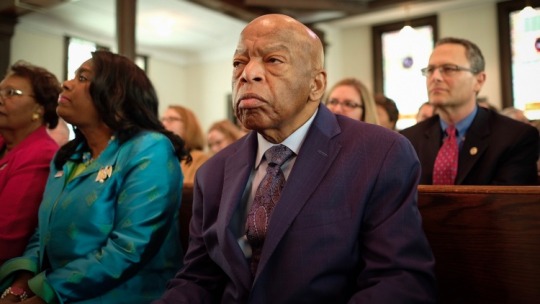
Let’s get to a few of this week’s docs, and another wonderful movie that will be available via Virtual Cinema this week is Dawn Porter’s JOHN LEWIS: GOOD TROUBLE (Magnolia/Participant), which showcases the life and political career of ‘60s Civil Rights activist and Georgia Congressman John Lewis, who has really seen a lot in his 80 years. Porter, who produced and directed Trapped and Spies of Mississippi, follows Lewis around during the lead-up to the 2018 election where winning the House back is crucial for the Democrats, superimposing that with chapters from Lewis’ long life, including some archival footage that even he hadn’t seen. (The title “Good Trouble” comes from a speech Lewis gives while on the campaign trail, saying that protesting and getting arrested is exactly that.) I don’t think I have a lot to say otherwise about this fantastic doc or Lewis himself other than the fact that Magnolia would have been wise to release this movie two weeks earlier, since Lewis continues to play such an inspirational role in the discussion about race and equality, but also about protesting peacefully but persistently to get the changes that need to be made.
Another really good doc that I recommend is Liam Firmager’s SUZI Q (Utopia Distribution), which if you’re over a certain age, you might immediately realize that it’s a doc about ‘70s rocker and feminist icon Suzi Quatro, who had huge rock hits in the UK and Australia, but didn’t really have an impact in the States until she appeared on the hit show “Happy Days” as Leather Tuscadero. There are definitely parallels between this film and the amazing Joan Jett: Bad Reputation doc from a few years back, and not just because Joan Jett plays a key role in the Suzi Quatro story, having been an avid fan who almost modelled herself after the young rock star. I’m sure I learned more about Suzi Quatro watching this doc than anything I knew beforehand, as I’m not sure I ever realized how far into the musical theater world she went in the ‘80s and ‘90s, nor did I know about how her sisters felt left out when she went off on her own and found huge fame. If you’re a fan of rock music or just rock docs, it’s worth your time to keep an eye out for this doc, which is having a one-night only virtual premiere with a QnA with Ms. Quatro. You can learn more about that on the Official Site.
Cannes award-winning Japanese auteur Kore-Eda Hirokazu (Shoplifters) shifts his gaze to France with his new film THE TRUTH (IFC Films), which I saw when it premiered at this year’s “Rendezvous with French Cinema” before this whole pandemic began, and the movie’s planned March release was scuppered. This one stars French legends Catherine Deneuve and Juliette Binoche as mother and daughter, Deneuve as Fabienne, an aging French movie star who is about the publish her memoirs, as her daughter Lumir (Binoche) comes to visit her from New York with her actor husband (Ethan Hawke) and their young daughter.
Believe me, I really wanted to like this movie, but Hirokazu makes his first foray into Western filmmaking by making the kind of boring and pretentious French film withink the filmmaking industry that’s been done much better with Olivier Assayas’ Clouds of Sils Maria, also starring Binoche. I’m not sure why I couldn’t get into this, and it’s certainly not unwatchable if you’re into the cast and some of Hirokazu’s more noodly Japanese films, but there’s really nothing to this film that really jumps out and screams one to watch it, and trying to get through it a second time as a refresher was just a fool’s chore, so I won’t even be reviewing the movie persé. Either way, it will be available in “select theaters,” digital and cable VOD this Friday.
Opening in “select drive-ins” this Friday is Natalie Erika James’ RELIC (IFC Midnight), following its Sundance premiere where it received raves, but it will be available On Demand and digitally (and maybe even in other theaters) next week, so I’ll probably review it then. Oddly, this movie also involves three generations of women with Emily Mortimer playing Kay, who returns to her family’s country home with her daughter Sam (Bella Heathcote) after Kay’s mother Edna mysterious vanishes. Just as they arrive, Edna reappears just as suddenly, but won’t say where she was as her behavior becomes more dangerous, possibly possessed by an evil spirit. Again, I’ll watch this later this week and have a review for you next week.
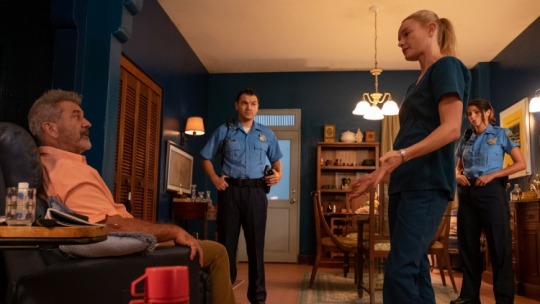
Now available on DVD, Blu-ray and digital is FORCE OF NATURE (Lionsgate), the new film from the prolific Michael Polish (of the famous Polish Brothers of Twin Falls Idaho). This one is an action-thriller starring Mel Gibson, Emile Hirsch and Mrs. Polish, Kate Bosworth, as a retired detective, a disgraced cop and a doctor who take on a gang of thieves as a Category 5 hurricane hits San Juan, Puerto Rico.
I have to say that I did not go into this movie without some trepidation, because the production companies involved have become almost synonymous with the VOD schlock that Lionsgate will release without any sort of theatrical push. In other words, Force of Nature was never meant to be seen in theaters. This one seems like a pretty simple premise with Hirsch being a disgraced police officer who ends up at an apartment complex as a hurricane and a couple crooks bear down, and he’s forced to team with a retired detective (Gibson) and his daughter (Bosworth) plus a couple others.
Of course, there’s also some trepidation by the decision to cast Gibson and Hirsch due to their various infractions over the years, Gibson’s having just been brought back to light recently. The thing is that their presence and that of Kate Bosworth brings more to what is not a particularly well-written thriller. This type of “bad cop” character doesn’t seem particularly well suited for Hirsch, as he’s still a bit of a “baby face,” but it also seems a little ill-timed to have that sort of character as a protagonist. The thing is that Hirch’s “Cardillo” doesn’t even stay in that mode for very long, as once he encounters Gibson’s character, he just can’t out-badass him. And honestly? Gibson is pretty funny in a role that could be his Lethal Weapon in his last days, but make no mistake that this is not a Mel Gibson movie since his character is discarded then quickly forgotten. On the other hand, Polish was wise to cast the great David Zayas from Oz as the film’s primary baddie, and some of the supporting cast like Stephanie Cayo and William Catlett offer more to the storytelling than the leads.
Even so, it’s hard to get past the bad writing like Bosworth’s character telling how she became a doctor when her father (Gibson’s character) shot up a bunch of turkeys, followed by an even weaker story by Cardillo on how he got his partner killed. These ho-hum moments really slow down any momentum created by Polish in the action pieces, but even those are hindered by the film’s overblown score.
Force of Nature isn’t great and it certainly has its problems -- did we mention the lion in the closet? -- but it also had the potential to be much much worse, especially if (for instance) I actually had paid to see it. Make no mistake that this is a very dumb action movie.
New York’s Film at Lincoln Center is upping its Virtual Cinema with a number of new programs, including John Lewis: Good Trouble (mentioned above), as well as Ulrich Köhler’s 2002 film Bungalow and the self-explanatory Four Shorts by Miguel Gomes from the Portugese filmmaker. These include Christmas Inventory / Inventário De Natal (2000), 31 (2001), Kalkitos (2002) and Canticle of All Creatures from 2006.
Downtown at the Film Forum, their Virtual Cinema is also showing John Lewis: Good Trouble, as well as Leontine Sagan’s Mädchen in Uniform (1931) and Jacques Becker’s Rendezvous in July (1949), which will be joined by Antoine and Antoinette next week.
Saturday Night Live’s Nasim Pedrad stars in LP’s Desperados (Netflix) playing a woman wh flies to Mexico with her two best friends (Anna Camp, Sarah Burns) to delete an angry Email she sent to her new boyfriend, but once there, she runs into her former boyfriend (Lamorne Morris).
A bunch of new series will debut on Netflix this week, so in order of my interest, there’s JU-ON: Origins, which is exactly what it sounds like, a prequel series to The Grudge movies, while Ben Dunn’s long-running Antarctic Press comic series Warrior Nun Areala has been adapted into the fantasy series, Warrior Nun. Now available on Netflix, Homemade is a quickly-produced anthology series of short films made under quarantine during the pandemic by a number of prominent filmmakers like Paolo Sorrentino, Pablo Larrain, Rachel Morrison, David Mackenzie and more. The Baby-Sitters Club is based on the best-selling book series with Sophie Grace, Malia Baker, Momona Tamada, Shay Rudoph and Xochitl Gomez as a bunch of middle-schoolers who start a babysitting business in their suburban Connecticut town. Also, that George Lopez stand-up special I mentioned last week actually opens this week.
I also want to give a thumbs up to the Jason Reitman-directed Home Movie: The Princess Bride, which premiered on Quibi earlier this week, spinning off of Reitman’s hugely successful live script readings. In this case, he has a number of big stars recreating the scenes and roles from the popular movie using whatever they have at home. So far, the recreations have included Tiffany Haddish, Josh Gad, Adam Sandler, Common, Hugh Jackman with more to come as different actors play the roles as the series goes on. Not sure how they’re gonna cover the entire movie over 10-episodes of 5 or 6 minutes each, but I guess we’ll have to see.
Amazon Prime will launch its own new crime series Big Dogs starting Wednesday that takes place in a number of underworld after-hour clubs called “Speaks.”
I probably should have included this in last week’s column but David (How to Survive a Plague) France’s new doc Welcome to Chechnya (HBO Documentary Films) debuted on HBO on Tuesday, which means you can probably still catch it on HBO Max. This one involves a group of brave activists who are risking their lives to confront the anti-LGBTQ persecution happening in the Russian republic of Chechnya, which includes detention, torture and death from the authorities.
Tonight, you can also catch the doc Born to Play, which will have its premiere on ESPN, following the Boston Renegades, a women’s tackle football team over the course of the season after losing their championship the previous year. I haven’t seen it but I like a good inspiration sports doc as much s the next guy.
Other movies hitting the digital airwaves that I just didn’t get time for this week include Skyman (Gravitas Ventures) and Homewrecker (Dark Star Pictures/Uncork’d Entertainment).
Next week, more movies mostly in drive-ins, you lucky people with cars! Oh, speaking of drive-ins, Amazon Studios is kicking off its “Night at the Drive-In” series tonight with the “Movies to Make You Fall in Love” double feature of Love & Basketball and Crazy Rich Asians. You can find out if there’s a drive-in near you doing this program on the Official Site. I really wish I drove or had a friend with a car.
By the way, if you read this week’s column and have bothered to read this far down, feel free to drop me some thoughts at Edward dot Douglas at Gmail dot Com or drop me a note or tweet on Twitter. I love hearing from readers … honest!
#TheOutpost#JohnLewisGoodTrouble#Hamilton#ForceOfNature#TheTruth#Movies#Reviews#VOD#Streaming#TheWeekendWarrior
1 note
·
View note
Text
How does one of the novels studied reflect on the differences between history and Story-Telling?
In this essay, the question asks how the difference between history and storytelling is presented in one of the texts studied on the course. In this particular essay the novel chosen is Ian McEwan’s Black Dogs.
McEwan is a well-known author, renowned for his use of macabre imagery, and disturbing adult themes. In his novel Black Dogs, there is a complex number of themes included in the narrative, including social, political and ideological tensions. A common trope in his novels is that the narrator has something to do with literature, whether it is writing, researching or reviewing literature. In his novel Black Dogs, the protagonist attempts to write a book of his mother in law’s story, which takes place just before WW2.
The main threads of this story take place in Vichy, France. Historically, this was a particular town that was ruled by the Nazis until they were liberated in 1945. Until then it had been used as a proxy for the Nazi government.
The frame of the story the protagonist is narrating is set in the 80s, when both the war and the occupation have ended, and just the shadows of these things remain.
However, the way we receive this story is through the two digressional characters narrating their conflicting experiences to their shared son-in-law. This shows that history is not neccesarily one collection of events, but a mix of perceptions of those events. (e.g. June’s experience with the Black Dogs would not be the same as the men and women who they were trained to rip apart).
One piece of imagery McEwan uses to affect the reader is the Churchillian image of the Black Dog. Neither Jeremy nor Bernard ever experience the Black Dogs for themselves. This creates two issues – one of the unreliable narrator, and one of constant hearsay. Jeremy states the problem of an unreliable narrator outright when June starts telling him the story again; “I swear she adds another dog every time she tells that story”. This also shows the obsession humanity has with sensationalism, and is an issue throughout the novel with every story that the reader is shown.
However, the stories we receive from other characters such as the mayor’s
somehow makes the encounter seem more real
“She had been raped by the Gestapo, excuse me Madame” and she placed her hand on June’s
“That’s what we all thought” the Maire said. “That’s not what we discovered later…Pierre and Henri Sauvy…They saw it happen…but they tied Danielle Bertrand over a chair…It wasn’t the Gestapo who raped her. They used…The simple truth is, these animals can be trained.”
Even though we are shown several instances where they attack humans, we have no evidence that the ones who attacked June were the same who attacked Danielle, or that they existed at all. However, when Madam Auriac goes on to deny that this could have happened, it seems very desperate, and somehow her disgusted reaction gives the story more weight. This makes it seem as though she knows it is true, but simply doesn’t want to believe it.
The reason Madam Auriac gives for the two drunks making up the story is that Danielle was a wealthy woman whom they were jealous of. However, with the testimony of June’s experience it seems a desperate qualifier to the original theory.
Like many holocaust deniers, she refuses to believe the awful story about her friend, simply because it was too horrific to accept. Many Nazi collaborators had a similar reaction when being shown the atrocities inflicted upon their friends and neighbors. Many deniers claim that they knew what was happening but simply didn’t know to what extent the suffering was perpetrated due to propaganda or even self inflicted ignorance.
However, with all that is known about the Nazi atrocities, and the horrific stories that are still being constantly unearthed today, it is sufficed to say that the two characters that witness the bestial rape in the Nazi offices were probably telling the truth. In any case, they would have had to have particularly grim imaginations to lie about such a thing.
In the novel there are differing ideologies playing on the same events:
June and Bernard experience; the rational and spiritual, the Augustinian and Iranaean. Both characters see history differently. Both experience the black dogs differently, and both end up with different world views in the end of their relationship. This can be seen through the way June mocks Bernard’s political alliances as a mouthpiece for the labour party.
“Do you know what he wanted to talk about when he came last month? Euro-communism!...He said he felt optimistic!...Jeremy, he was actually excited! Just as we were back then. Progression is too kind. Stasis, I’d say. Stagnation.”
Through her stories which she tells to Jeremy, June portrays a postmodern apathy, resulting in a worldview of cyclical history: the idea that history repeats upon itself with no real change in the way we live our lives, therefore resulting in the “stagnation”. This can be seen through the fact that Hitler and Ghandi’s fame and infamy took place in the same historical period. However, these ‘cycles’ are mainly anecdotal, reliant on aposteriori knowledge of the world, rather than something that can be measured or quantified.
This then brings into question, what is history and what is storytelling? Traditionally, storytelling is thought to be linked to fiction, and history to fact. However, this would then cause the relaying of personal experience into the wrong category.
“As I was saying all this, our train pulled in with a great clatter and an awful lot of smoke and steam, and just as it came to a stop June burst into tears and threw her arms around me and broke the news that she was pregnant and that the little insect in her little hands made her feel not only for the life that was growing inside her, but for all life, and that letting me kill that beautiful dragon fly was an awful mistake, and she was sure nature would take its revenge out on the baby
Most of the stories in which June is mentioned are given an underlying theme of superstition which Bernard rebuffs with cold skepticism. However, whilst it is not factual that June held a dragonfly which would hurt her unborn child, it is part of her own narrative, something personal to her.
The fact that Jeremy then goes on to defend her when she isn’t present shows how the younger generation of the post war period became heavily involved in it’s history. By asserting that “Jenny’s extra finger” was directly caused by “the moth’s retribution”, Jeremy is imposing a grand narrative onto both Bernard and June’s lives. The fact that we hear the story from Bernard however, misappropriates the ownership of that story. Although we know what June thinks she experienced, we are receiving her experience from her ex husband instead, thereby rationalizing her story beyond the grand narrative she insinuates.
However, according to Adorno, there is indeed a grand narrative to our lives. All humans strive to organize nature and violence is our way of rationalizing nature. Therefore, all humans are innately violent, and the holocaust whilst horrific was not anything new. History seeks to remember what time annihilates – time seeks ends to everything. The change in production depends upon the individual remembering history, something which doesn’t exist without people remembering it.
This brings in the idea however, of a grand narrative; that humanity is heading towards something. In the novel Black Dogs, there is nothing left to get better or worse. As stated by Jeremy, when entering the concentration camp museum, “there was no one to feed or free”. This is ironically reminiscent of Fukiyama, who claimed in his own works that “History was finished” as it had reached an equilibrium, and that justice was now restored.
However, These ideas are born of grand narratives. These ideas date back to the biblical ideas displayed in Agustinian an Iranaeian theodicies, both based on the different accounts of The Fall. Augustinian theodicy supposes that because of Adam and Eve leaving the Garden of Eden creating an an equidistance with God, the world has depreciated, and evil has increased. The Irenaean theodicy, however, argues that God neither created nor necessitated evil, and that evil helps fully form humans. The alternative according to him, would be for us to live in a “toy world”.
Both are too Eurocentric however. As the decades have progressed since WW2 and the holocaust, there has been more global coverage of other countries suffering from mass genocide. Therefore these theories on world progression are outdated, and the evil in the world is not growing we are simply becoming more aware of it.
Whereas Hegel states that the soul is a determinate object, meant for a higher purpose as this quote states:
Spirit does not toss itself about in the external play of chance occurrences; on the contrary, it is that which determines history absolutely, and it stands firm against the chance occurrences which it dominates.
This brings into play the idea of cold rationalized violence, a sobering legacy left by the Nazis. Whilst Jeremy experiences the cold mechanized processing which Nazi camp inmates experienced during Auchwitch, he still can’t imagine the true horror of what the camp experience was like. In this passage he even slightly admires it the efficiency with which death and burial was carried out.
“On our way out, Jenny spoke for the first time in an hour to tell me that in one day in November 1943 German authorities had machine gunned thirty six thousand Jews from Lublin. They made them lie in gigantic graves and slaughtered them to the sound of amplified dance music”
Because there is nothing in this quote condemning the efficiency and irony of the Nazi’s methods in the extermination process, it leaves the reader with a sinister air of praise. It helps show the detachment of the younger generations of post war Britain and how they don’t immediately relate to the history unfolding around them, almost showing a sense of being overwhelmed by such a volume of history.
The removal of the narrator from the novel’s main period of digressional action helps illustrate this point. Jeremy is not a part of this story, yet he makes it his simply through visiting the camp. “There was no one to feed or free” Perhaps this is McEwan accepting that he himself as a post war writer, has no part in telling the stories of the WW2 generation.
In conclusion, storytelling is a powerful tool from any perspective. Past or present, the way that the generation who endured and fought through the holocaust are represented should always be represented in a powerful way, as should the later generations learning about them.
2. Philosophical problems in the novel
This question asks for the evaluation of the philosophical problems in a novel studied on the course. This part of the essay will concern with the novel Black Dogs, by Ian McEwan.
The novel itself is set in the 80s, with the advent of the Berlin Wall being destroyed. Here McEwan is using retrospective to look back on something out of his, and anyone else’s control.
A question which seems to arise a few times is the morality of nature. When June is attacked by the Black Dogs trained by the Nazis, the reader would most likely blame the men who trained them. However, surely if this principle can be applied to the dogs themselves, then it can go further. However, many choose not to, as if one goes far enough, we end up blaming the Allies, those who supposedly ‘won the war’ for us in the first place.
During the post war period, many tried to create conditions to help explain the psychological conditions of the Holocaust. One of these experiments was implemented by Jewish psychologist Milgram. The actual participant would be placed in a room with a number of electric shock controls. They would then meet an actor who would pretend to go into the next room for a memory test. The actor would then pretend to receive electric shocks going up to 250 volts, acting as though he had heart trouble and remaining silent after a certain number of pretend shocks. The aim of the experiment was to show that Germans were more compliant than Americans, due to defined cultural differences, thereby creating a test for fascism. However, when testing the environment on 41 white working class American males, he found that most reacted by complying. This actually shows that most people do comply with authority when under stress.
As this mainly shows how people can be convinced into commiting crimes they’d be uncomfortable with, a better example of conditions allowing the id to perpetrate harm is Zimbardo. ZImbardo’s study consisted of a group of college students who were going to take turns being the guards and prisoners of a made up prison, with hostile conditions. However, the prisoners became so disturbed and agitated that the study only lasted 5 days before ending. The result showed that the guards often enjoyed inflicting pain or discomfort, even asking for extra shifts.
However, rather than show why the holocaust happened, these studies simply show us that normal individuals can react in these ways should the conditions fit their purpose. In a way it is easier to focus on the evil itself, rather than the cause.
In conclusion, there is no overall grand narrative in the post modern era which can explain atrocities such as this. Since global news has taken over, the significance of a European war ending whilst millions die overseas creates a feeling of apathy amongst the civilian population.
0 notes